YEARS STRONG IN 2024
The newspaper of the Independent Education Union of Australia NSW/ACT Branch (vol 44 #4) June 2024
PP 100000871 ISSN No: 0728-4845

The newspaper of the Independent Education Union of Australia NSW/ACT Branch (vol 44 #4) June 2024
PP 100000871 ISSN No: 0728-4845
• Fix our pay • Address our workloads • Boost parental leave
Guarantee fair processes • Improve leave for support staff
The IEU has begun bargaining for new multi-enterprise agreements (MEAs) for teachers and professional, administrative and operational staff in independent schools represented by the Association of Independent Schools (AIS). After consulting extensively with members in recent weeks, the IEU’s claim calls on employers to: fix your pay; address your workloads; boost parental leave; improve leave for professional, administrative and operational staff; and guarantee fair processes.
The union met with the AIS on Wednesday 29 May (for full details, see p 3).
Restore the pay premium for teachers
Teachers in NSW government schools and Catholic systemic schools achieved unprecedented pay rises of 8% in 2023, and some independent schools agreed to extra pay increases above their current multi-enterprise agreement rates.
However, these increases were often quite small, and some schools did not increase pay rates at all.
Many teachers in independent schools are now paid less than teachers in NSW government schools and Catholic systemic schools, and others only just above. Teachers in AIS schools have previously enjoyed a premium of 5% to 7%, but this has now all but disappeared.
A better deal for professional, admin, operational staff
When we compare pay rates under the Independent Schools NSW (Support and Operational Staff) MEA with rates applying to NSW Catholic systemic and government schools, we find staff in AIS schools are paid below their comparator at all points of the pay scale.
Conditions for these staff do not match those applying in Catholic schools. We are calling for improvements to long service leave and personal/carer’s leave.
Addressing teacher workloads
The NSW government, NESA, the federal government and many Catholic school employers have all acknowledged the workload pressures both new and experienced teachers face.
However, independent school employers fail to recognise the gravity of this problem and refuse to take coordinated measures to reduce teacher workloads.
The IEU is calling on independent school employers to agree to: establish school-based committees to identify ways to reduce workloads develop school-based standards on face-to-face teaching
hours, release time, the number of meetings, duties, extras, and expected days of attendance including at weekends, to provide transparency and certainty for teachers ensure full implementation of the new right to disconnect provisions
ensuring work requirements do not exceed those set out in government fact sheets (NESA Fact Sheet; NCCD Evidence Fact Sheet; and the AITSL Australian Teacher Performance and Development Framework Fact Sheet, see liftout, pages 8-11).
Many teachers in independent schools are now paid less than teachers in NSW government schools and Catholic systemic schools.
Parental leave
Parental leave provided in independent schools falls below that provided in other school sectors in a range of ways, both for mothers and fathers.
Female employees are currently entitled to paid maternity leave or adoption leave of 14 weeks, but the AIS considers this to mean that the period of paid leave does not count as service for other leave (except annual leave) and pay progression.
In contrast, in both NSW Catholic systemic schools and government schools, paid parental leave accrues other leave and pay progression. Also, a total of 12 months parental leave (including the 14 weeks) counts as service for pay progression.
In the Australian Capital Territory, employees in Catholic and government schools are entitled to 24 weeks paid parental leave.
The union also believes superannuation should be payable on paid parental leave.
Independent schools have also consistently denied access
to paid parental leave to fathers who wish to take on primary childcare responsibilities after the birth of their child (instead of the mother). In other sectors, the entitlement is to “paid parental leave” not “paid maternity leave”.
Catholic and government schools also provide substantially better paid parental leave to non-initial primary carers (usually the father) who assume the role of primary carer in the first 12 months after birth or adoption, after a period of care by the mother.
Fathers who are non-initial primary carers are entitled to 12 weeks paid leave, in addition to the two weeks of concurrent leave taken at the time of birth or in the first 12 months. In comparison, independent schools only provide fathers with two weeks of concurrent leave at or around the time of birth or adoption.
The union is calling for fair processes for all employees to be enshrined in your MEAs, consistent with 2024 expectations. These include:
promotion appointments should be merit-based, in accordance with fair documented processes transparent procedures to apply for flexible work arrangements a right to have the Fair Work Commission determine workplace disputes workload requirements to be set out clearly for all teachers, and no discrimination on the grounds of gender or disability.
Has the union chapter at your school endorsed the claim and returned it to the union? Although most chapters have done this, we urge all remaining chapters to send them to us.
We also invite members to raise any matters they consider are missing from the claim.
The most important thing you can do is talk to your colleagues about this claim for pay and conditions and urge them to join the union so they have a say.
Remember that under new provisions of the Fair Work Act union delegates (that is, elected IEU reps) have the right to reasonably communicate with union members and employees who are eligible to become members, including through email. This makes crystal clear your right to talk union business at work. If your school does not have a rep, consider electing a rep and a chapter committee – it helps to spread the word if you form a union team at your school, preferably involving both teachers and support staff.


ieunswact
Newsmonth is published eight times a year (two issues per term) by the Independent Education Union of Australia NSW/ACT Branch.
Executive Editor Carol Matthews, Secretary, for and on behalf of the IEU Executive and members
Managing Editor Monica Crouch
Journalists Sue Osborne Lucy Meyer Katie Camarena Monica Crouch
Photo Journalist Katie Camarena
Graphic Design Chris Ruddle
Proofreader Helen O’Regan
Contributions and letters from members are welcome. These do not reflect endorsement if printed, and may be edited for size and style at the editor's discretion. Write to:
Newsmonth
485-501 Wattle Street
ULTIMO NSW 2007
GPO Box 116
SYDNEY NSW 2001
Tel: 8202 8900
Toll free: 1800 467 943
Email: ieu@ieu.asn.au
www.ieu.asn.au
This publication was produced on the unceded lands of the Gadigal People of the Eora Nation. The IEUA NSW/ACT Branch acknowledges the Aboriginal and Torres Strait Islander peoples as the traditional owners of the lands where we live, learn and work, and pay our respects to their Elders past and present.


Community leaders and teachers are united in addressing the alarming incidence of gender-based violence, sexual harassment, abuse and discrimination.
The stabbing murders at Bondi Junction on 13 April and subsequent attacks and deaths have highlighted the pervasive nature of gender-based violence and sexual harassment towards girls and women, underscoring the need for comprehensive measures to ensure the safety and wellbeing of all women — and particularly students in our schools.
On 27 April, people rallied and marched in their thousands throughout Australia, calling for more to be done to address the root causes of genderbased violence. NSW Premier Chris Minns and NSW Minister for Youth and Minister for Mental Health Rose Jackson joined the Sydney march.
From verbal harassment to physical assault, staff and students are facing many challenges that compromise their right to a safe and supportive learning environment. Many of these incidents go unreported, perpetuating a culture of silence and impunity that further emboldens perpetrators.
Train teachers, educate parents and students
One move is to include sex education programs that promote consent, respect, and healthy relationships from an earlier age. On 26 May, the federal government launched a $40 million education campaign to combat confusion around consent. The campaign will urge adults to educate themselves so they can hold vital discussions with their children.
Elsewhere, there is a growing consensus on the need for specialised training for teachers and other school staff to recognise, address, and report instances of gender-based violence and sexual harassment.
There are also calls for schools to foster a culture of zero tolerance towards all forms of violence and discrimination.
Liz Heggart
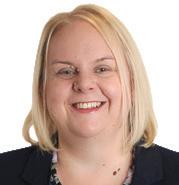
Over the past month, my thoughts have lingered on how our membership is united for a common purpose and yet is so varied in other ways.
I spent time talking to some prac teachers at my school. A couple of them had heard about the union and knew what it was (one was already a student member) but the others didn’t know there was a union and didn’t even know what its purpose was.
Not surprisingly, those who know of the union usually come from families that also have teachers, support staff, nurses or tradies in them, and the importance of union membership has been instilled in them from a young age. For these staff, union membership is inevitable and non-negotiable.
The challenge is in recruiting the new members, both teachers and support staff alike, who have either come straight from school to uni to work, or who have come to
This entails creating safe spaces where staff and students feel empowered to speak out against injustice and seek support without fear of reprisal or stigma. It also requires creating partnerships with police, healthcare providers, and community organisations to ensure survivors receive the care and assistance they need.
By working together, we can create a future where every student can pursue their education free from the threat of harm or exploitation. The time to act is now.
How your union can help
If you are experiencing sexual harassment or misogyny in your workplace, there is support available.
The IEU holds employers to account on their legal responsibility to prevent discrimination and sexual harassment in the workplace.
The positive duty reforms to the Sex Discrimination Act, introduced in December 2022 as the result of pressure from unions including the IEU, impose a legal obligation on organisations and businesses to take proactive and meaningful action to prevent relevant unlawful conduct from occurring in the workplace or in connection with work.
The IEU supports members should they become victims of misogyny. We urge you to call your organiser.
The IEU is pushing for clearer community guidelines, stronger moderation, and more effective mechanisms for reporting and removing misogynistic content by improving the regulation of social media platforms.
The IEU was also part of the ‘We won’t wait!’ campaign for 10 days paid family and domestic violence leave a year for all employees, including full-time, part-time and casual employees, now included in the National Employment Standards.
For more, see IE magazine (packaged with this edition of Newsmonth): Meet Chanel Contos, the woman behind the Teach Us Consent campaign, IE magazine, p 6
The influencer infiltrating classrooms, IE magazine, p 22.
schools after pursuing other professions first, and haven’t experienced any union involvement previously.
How can we show them that being a union member is a critical aspect of their work life?
How can we show them that not only is union membership essential for protecting them as an individual, but that it is also about being part of the collective and working together to improve the working conditions for all?
I see our dilemma as threefold:
In the current climate of cost-of-living pressures, it is becoming increasingly difficult to convince people to part with their hardearned money that is otherwise needed to cover increasing mortgages, rent and bills. Ongoing teacher shortages mean we are bleeding teachers to other professions or to other sectors.
Younger staff enjoy the wins and gains unions have fought hard for over the past century, and even the past few years, and find it hard to see why they need to join if they have these improvements regardless.
Despite this, our challenges in recruitment are not insurmountable.
We can explain to potential members that being a union member is like taking out insurance for your job – you hope you’ll never need to use it but you have it just in case. We can tell them union fees are tax-deductible and that the union provides free PD to all members.
We can explain that the gains we all enjoy today reflect the power of standing together as a union. We can invite them to a chapter meeting and to meet an organiser.
All of these ideas for recruiting work, but the one way of getting someone to join the union that has the most success is simply inviting them, and research conducted by the Australian Council of Trade Unions (ACTU) reinforces this. I know from my own experience that simply striking up a friendly conversation with a colleague and inviting them to join the IEU is the most powerful tool we have.
So I leave you with this question: Who will you invite to join today?

IEU representatives met with the Association of Independent Schools (AIS) on 13 May and 30 May 2024 to discuss the proposed new multi-enterprise agreements for teachers and professional and operational staff.
At our meeting on 30 May, we discussed details of the IEU claim (see p 1) and how pay and conditions of employees in independent schools compare with those of employees in other school sectors.
New MEA for teachers
The AIS has confirmed it intends to combine the three current multi-enterprise agreements (MEAs) – Standards, Hybrid, Steps Models – into one Teachers MEA.
The AIS provided very few details at the meeting about pay rates and other conditions under the MEA proposed by employers.
However, the AIS did state there will be one teacher pay scale reflecting the pay scale applying in NSW government schools and NSW Catholic schools.
This pay scale has two steps for Graduate Teachers (including conditionally accredited teachers) and five steps for Proficient Teachers (six steps are proposed for the ACT).
Additional allowances will apply for those who are Experienced Teachers as a result of the ISTAA process, and those who are Highly Accomplished.
The AIS did not reveal the pay rates it would offer.
The IEU is not opposed in principle to changes to the current pay scales, depending on the pay increases the AIS offers. However, there are clearly significant issues to be negotiated about how existing teachers are placed and paid on the new scale; as well as compensation for any teachers who may be disadvantaged as a result of the changes.

• Fix our pay
• Address our workloads
• Boost parental leave
• Guarantee fair processes
• Improve leave for support staff
The union will closely scrutinise the transition from the current three-steps Standards Model to a new seven-step pay scale. Safeguards will also be essential for teachers currently at Band 3 Experienced Teacher under both the Standards Model and the Hybrid Model.
The union understands that the ISTAA process will continue and provide for additional remuneration for teachers who complete the process. We are therefore advising members who have initiated applications to follow through with them.
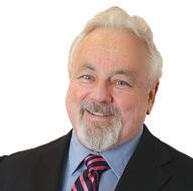
In October 2023, after a two-year campaign and concerted industrial action, teachers and support staff in Catholic systemic schools won historic, justified and overdue pay rises that went a long way to recognising the importance of the work they do.
The Broken Bay Diocese paid 1.5% more to both their teaching and non-teaching staff and confirmed extra release time for both primary and secondary teachers in their Work Practices Agreement. Support staff in this diocese also received 8% increases on top of the historic pay rises support staff in other dioceses had won.
Agreements covering teachers and support staff in 10 Catholic systemic dioceses expire in October this year, while the Broken Bay agreements expire at the end of December.
At the meeting of the IEU’s Council in mid-June, we will start discussions about our claim for the next round of bargaining.
Teachers across the state will recall that the NSW government proposed that if it provided the substantial pay increase in October 2023, teachers would then need to accept increases of just 2.5% per annum for the following three years.
Union members understood that these paltry increases would not fix the staff shortage crisis – and without solving the staffing crisis, it is very difficult to address workloads.
Members of the NSW Teachers Federation did not accept this proposal, nor did IEU members in Catholic systemic schools. The unions, and common sense, prevailed.
Staffing crisis means heavy workloads
Data from the Australian Curriculum, Assessment and Reporting Authority (ACARA) shows that Catholic schools in NSW have the highest student-teacher ratios of any sector, with an average of almost 15:1, compared to 14:1 across government schools and 12:1 for the independent sector.
Fewer teachers educating more students can only mean more work for our members employed in systemic schools.
Catholic systemic employers need to engage with the IEU to address critical workload concerns. Members provide numerous reports of their colleagues leaving systemic schools
to pick up employment in other sectors or in other industries due to unsustainable workload pressures in their workplace.
Public sector pay increases
The NSW government is proposing pay increases for public servants of 10.5% over the next three years, a figure that includes legislated increases to the superannuation guarantee.
Reaction from public sector unions has been muted at best. The NSW Nurses and Midwives’ Association, the NSW Police Association and the NSW Fire Brigade Employees Union are calling for substantial pay increases above this proposal.
The NSW government says its offer is a starting point and it hopes to negotiate “productivity reforms” with unions “in exchange for further pay increases”.
We need more education students
The one-off huge boost to teachers’ starting salaries in 2023 will not be enough to attract students into teaching courses.
Our members know that only huge improvements to real wages and alleviation of unsustainable workloads are crucial to ensuring we can recruit and retain staff in our schools. Until then, students are likely to keep shunning education degrees.
On 21 May 2024, the Daily Telegraph reported that the proportion of NSW school leavers entering teaching degrees had fallen for a third year in a row: just 4.74 per cent of students had applied, down from 6.12 per cent in 2021.
In September 2023, Federal Education Minister Jason Clare said the number of young people going into teaching had fallen by about 12 per cent over the past 10 years. He said only half those who start a teaching degree finish it and, of those who finish it, 20 per cent leave after less than three years. These are bleak statistics, but our history shows that united we can effect lasting improvements to salaries and conditions.
Stand together, have a say
As we did in 2022-23, IEU members will need to stand together to demand better salaries and reasonable workloads.
If you want to have a say in the 2024 claim, get set to hold chapter meetings later this year so members can discuss the claim and endorse it. Talk to your colleagues who have not yet joined their union and invite them to get on board. We are stronger together and collectively we can make a difference.
At the meeting, the AIS did not provide a response to our claims about conditions (see p 1), nor had the AIS provided any information about changes in conditions that school employers may seek.
New MEA for professional and operational staff
The union spoke at length about comparisons in pay for employees in independent schools with the pay of employees in other school sectors.
The union considers that pay rates should be increased and that employees should be able to progress more easily between classifications and steps to higher rates of pay.
The classifications are difficult to apply in many cases because they are unclear and open to interpretation, so staff are reluctant to apply for higher classifications.
We also raised member concerns about work health and safety in special schools and the high level of responsibility and demands these members face.
Improved leave was also a key issue under discussion.
The AIS has undertaken to consider the detailed evidence we provided on the pay disparities for the groups we identified (almost all classifications) but no response was provided at the meeting.
steps
The next bargaining meeting is scheduled for 17 June. The AIS has so far been silent on specific matters, and the union will be pressing them to provide details for discussion so we can progress our members’ claim.
In the meantime, we urge you to discuss the claim with your colleagues and invite them to join the IEU. There is real strength in numbers.
Meet four reps from independent schools, p 5
Christian Schools Australia (CSA), which represents 35 Christian school employers, is holding on to a position that would see Christian school teacher members paid a mere 1.5% increase in 2025 and 2026.
While CSA has said the agreement will mean salaries catch up to those paid in Catholic systemic schools and NSW government schools this year, it wouldn’t commit to preventing salaries from falling below that benchmark again during the life of the agreement.
The recent NSW government public sector pay offer (inclusive of legislated superannuation increases) is: a 4% increase this year; a 3.5% increase in 2025; and a further 3% increase in 2026. This is the starting point for negotiations, and it throws the paltry CSA offer into stark relief.
The enterprise agreement for NSW government school teachers expires in October this year but we believe the NSW government will not offer pay rises inferior to those on the table for other public sector employees.
When the IEU conducted a survey of Christian school members asking, ‘Do you think the IEU should agree to the offer proposed?’, 92 per cent of respondents resoundingly rejected that offer.
Of the numerous comments members made in this survey, this one speaks volumes:
“It is not appropriate that teachers in CSA schools are paid less than our counterparts in other NSW schools. I am continually disappointed (and a little insulted) that our employers do not consider it important that we are paid and valued at the same level as teachers in other school systems. We should simply be paid an equal amount. By not paying us equally, we may well lose quality teachers to other systems, and may not attract quality new teaching staff, thus devaluing our own system. Please insist that CSA simply agrees to pay us as much as the other schools in our state.”
Another one of our members provided us with the following quote from theologian, author and Christian school principal Graham Leo: “Christian schools ought to be leaders in good industrial relations. Trade unions were commenced by Christians who were outraged by the unethical treatment of workers. It was the followers of John Wesley in England who campaigned for the rights of workers to receive fair wages.”
Considering the NSW government’s public sector pay offer, the IEU will again press CSA to reconsider its position.
We extend a warm welcome to new members who have joined to be part of this campaign. We also encourage all our members in CSA schools to invite your colleagues to join the union and this fight for reasonable and just salary increases.
George Maniatis Industrial Officer
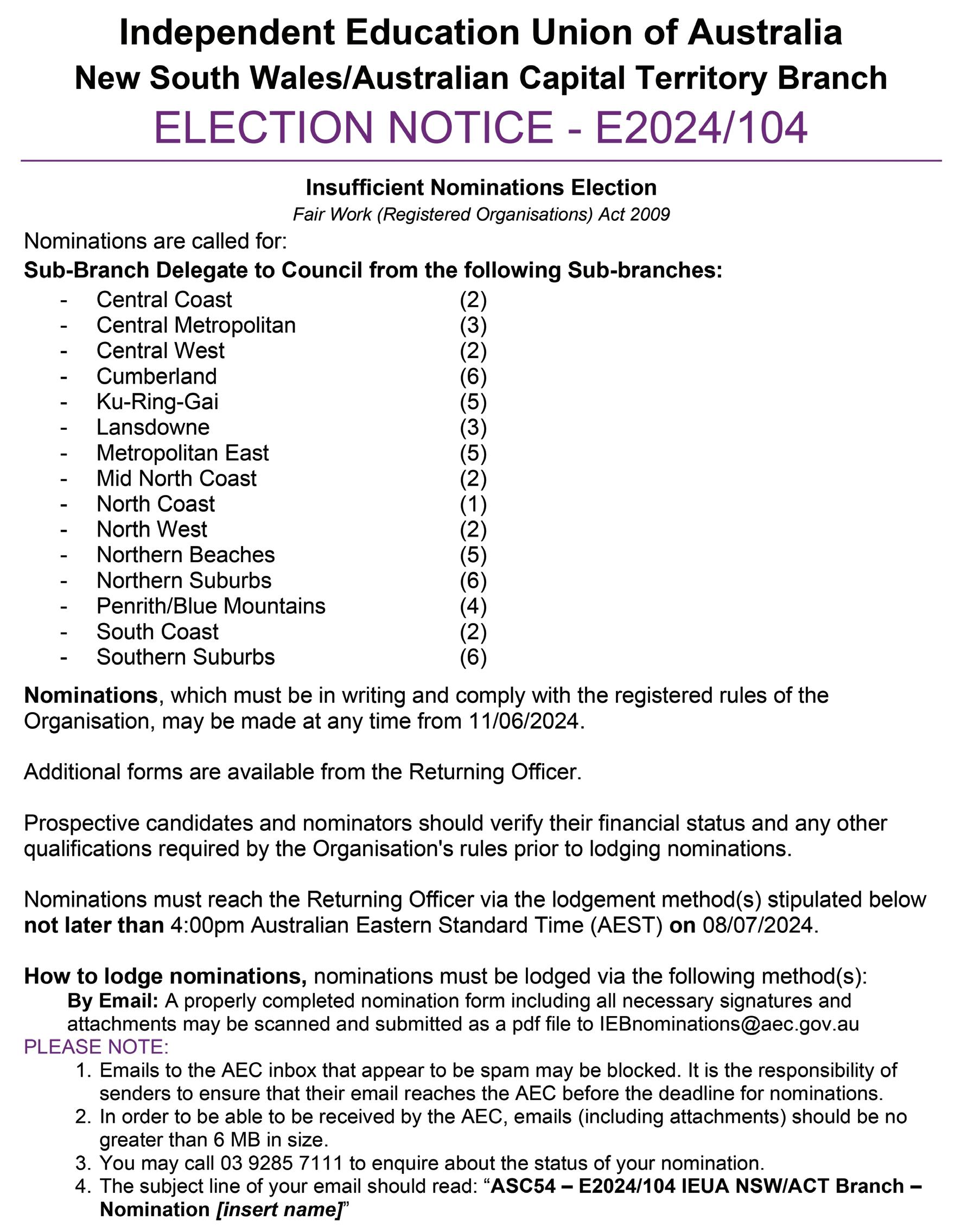
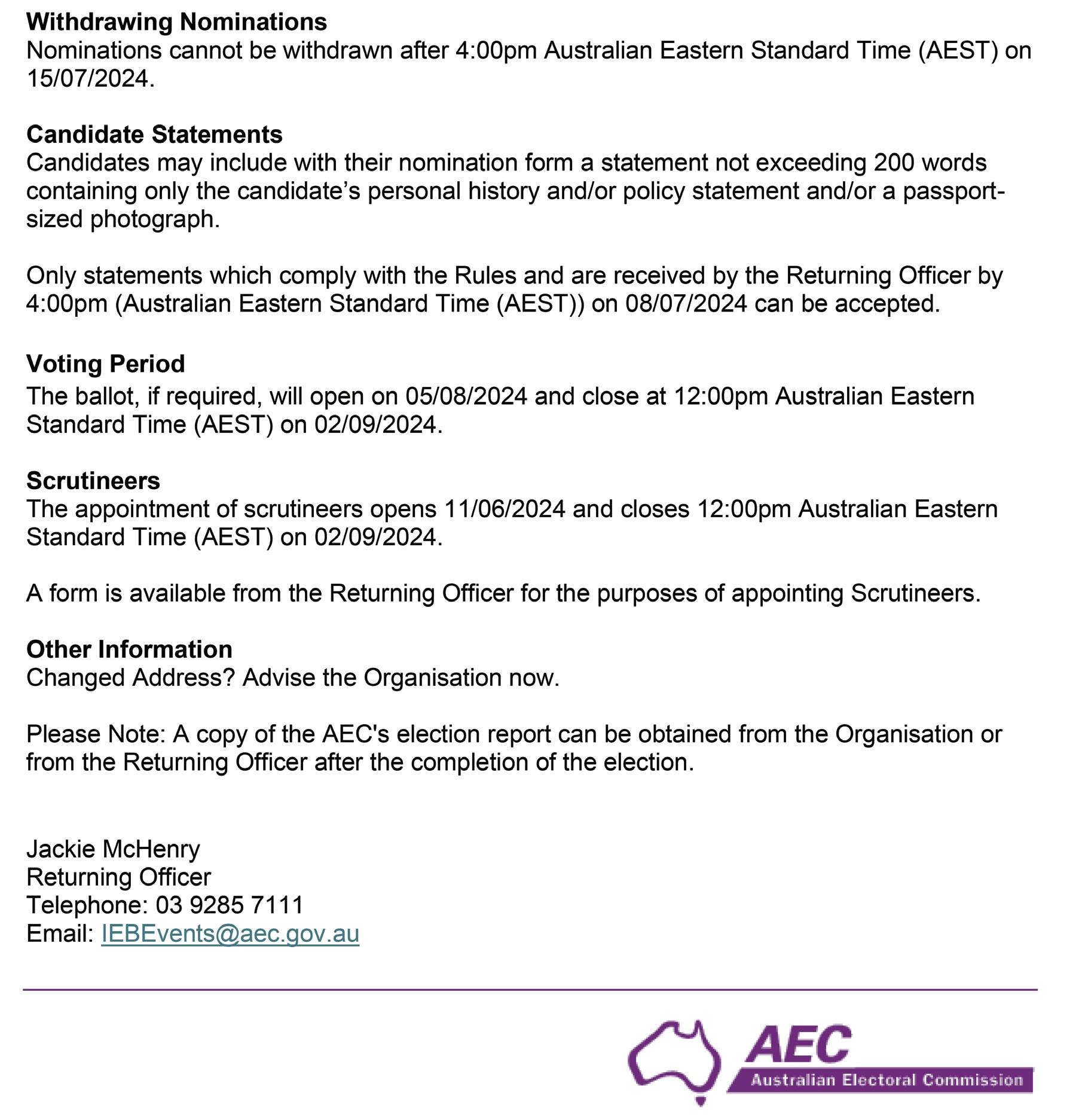
A second-round election of sub branch delegates to Council is under way (see all details at left). This is to fill vacancies left after recent elections as there were not enough nominations to fill all available positions in some sub branches. Nominations open from 11 June and close on 8 July at 4pm. Council is the governing body of the NSW/ACT Branch of the Independent Education Union of Australia. It brings together up to 115 delegates from our 20 sub branches and 21 elected Executive members. The IEU’s organisers, industrial officers and professional staff also attend Council but do not have voting rights. The IEU is made up of chapters that meet at the school level. Reps and chapter committees are elected at each workplace by members of the chapter. Reps and active members are encouraged to attend their local sub branch meeting. These sub branches meet once per term to exchange information and ideas with their fellow members and with union officers. There are 19 geographical sub branches and the Principals’ Sub Branch (see sub branch reports, pp 16-17).
Each sub branch is entitled to elect delegates to Council. The number of delegates is determined by the size of the sub branch. Most sub branches are entitled to elect six delegates to Council, with each sub branch entitled to elect at least four delegates.
Elections are held every two years. If there are more candidates than the required number of delegates, elections are conducted through a postal ballot of all members in their sub branch. Elections are official and conducted by the Australian Electoral Commission.
Council meets four times a year in Sydney, on a Saturday, with an Annual General Meeting each October, at which the IEU’s Annual Report is presented. Council meetings are an opportunity for delegates and union officials to exchange information and ideas and consider and determine the business of the union in the interests of members.
Attending chapter and sub branch meetings and becoming a Council delegate are great ways to get more involved in the IEU’s mission to advance the professional and industrial interests of teachers and support staff.
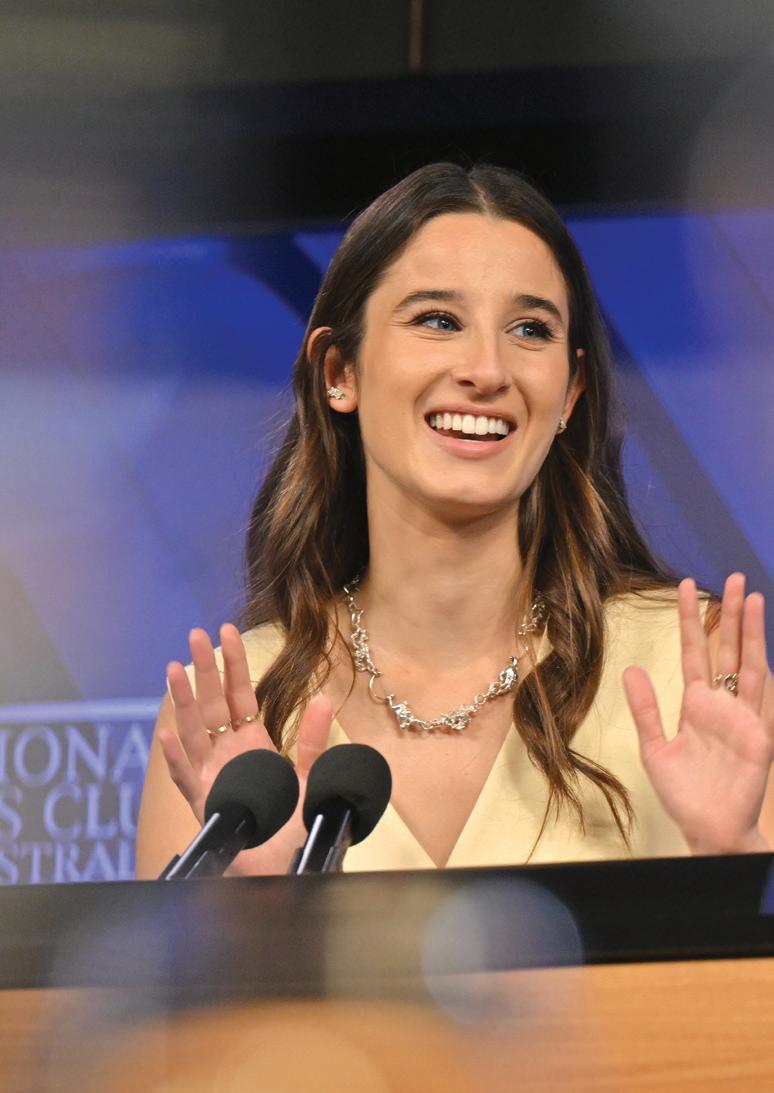
We invite all members to enjoy the second edition of IE magazine for 2024, packaged with this edition of Newsmonth
Inside you can read about the remarkable young woman behind the Teach Us Consent campaign, Chanel Contos, on the role of education in ending gendered violence.
Then step inside a classroom on the Pacific Island nation of Kiribati and see how climate change is impacting schooling, as an inspiring teacher calls for union solidarity to address the global crisis.
Closer to home, unionist and electrician Raven Maris talks about how learning a trade changed her life and why we need to encourage more girls to follow suit.
Read about how a misogynistic influencer is radicalising some Australian schoolboys and the impact it is having on women teachers, as IEU members share their experiences.
We hear from four experts about closing the gap in educational outcomes for Aboriginal and Torres Strait Islander students, as they look at the way forward.
Then learn about your federal union — how it works, what it does, and how it supports you.
This edition is packed with more great reads including how ‘wellness’ programs can be toxic, plus the many ways neurodivergent staff enrich schools. Remember, reading IE may count towards your PD.
Who they are, what they do
Whether you’re already a rep, or you’re considering becoming one, or you’d just like to know more, hear all about it from an experienced hand.
The group of IEU members at each school (known as a chapter) elects a union representative (or rep, sometimes called a delegate in legislation). Some schools have more than one rep: one for teachers, and one for support, administrative and operational staff.
The rep arranges chapter meetings, keeps members informed of union campaigns and negotiations and liaises with your union organiser. They are the first port of call for IEU members in the workplace.
Reps provide members with advice and information, and they help members with individual matters as a support person, directing them to their organiser (in the IEU office) when necessary.
The union provides training for reps (see below and ieu.asn.au/events). We invite all reps and chapter committee members to come and learn about your rights and responsibilities at work and to develop your union skills. IEU officers provide ongoing support for reps.
An effective rep listens to members’ concerns and suggests practical solutions. It is useful for reps to have a working knowledge of the key features of the enterprise agreement covering members at their school, and to be able to direct members to that agreement.
Good reps also establish clear channels of communication with the school leadership to avert potential issues or prevent them from escalating.
Reps are not expected ‘be’ the union at their workplace. The union is the members collectively – not some other group with magical powers. All members can support their rep.
The most rewarding part of being a rep is when members come and thank you for offering them a listening ear, providing advice that led to a workable outcome or advocating on their behalf when they were having difficulty finding their voice.
Growing your chapter is crucial – there is real strength in numbers, and it is every member’s responsibility to recruit new members. Strong chapters are essential to maintaining a safe and balanced working life at your school.
Keep union literature visible on the noticeboard and in the staffroom (including copies of Newsmonth), engage in conversations, keep members and potential members up to date on union negotiations with employers to improve your pay and conditions and, of course, encourage staff to join. Strong numbers are a key indicator of campaign success.
We urge all members to check in with their rep – a little support goes a long way. And if your chapter doesn’t have a rep, why not consider taking this on? Contact your organiser to find out more or call the union on 8202 8900 and ask for the Duty Officer.
Glenn Lowe IEUA NSW/ACT Branch Deputy President and teacher at St Joseph’s Catholic High School Albion Park
Reps


Caitlyn Esther started at Aspect South East Sydney School, a specialist school for students on the autism spectrum, as a volunteer, helping with visual arts. She then became a teacher’s aide, took a degree in Autism Studies at Griffith University, became a teacher in 2018, then an IEU rep this year.
“It’s been a steep learning curve,” Esther said. “We had a brilliant rep for a long time, but he’s recently retired, so I have big shoes to fill.
“I’ve picked up so much today at the IEU’s reps’ training. It gives us the framework of where our rights come from – it’s about understanding our rights are not a favour.
“As we approach enterprise bargaining, there are a lot of questions, and I’ll be able to relay to support staff and teachers why it’s important to join the union.”
Che Walsh-Kemp is a drama teacher at St Aloysius College, an independent school for boys from Year 3 to Year 12, where she’s been a rep for two years.
Anil Thomas is the new co-rep at Penrith Anglican College. When a teacher volunteered to be the rep for the primary school, Thomas put up his hand to be the rep for the secondary school
“I thought I would be happy to do that, working as a team,” he said.
A maths and chemistry teacher, Thomas began teaching in Australia in 2012, arriving from India after a few years teaching in the Middle East.


The IEU helped Thomas get teacher accreditation in NSW, giving him a strong understanding of the importance of union membership.
“It’s very important to have a rep, there are always issues happening and there should be someone to look after the interests of teachers and support staff,” he said.
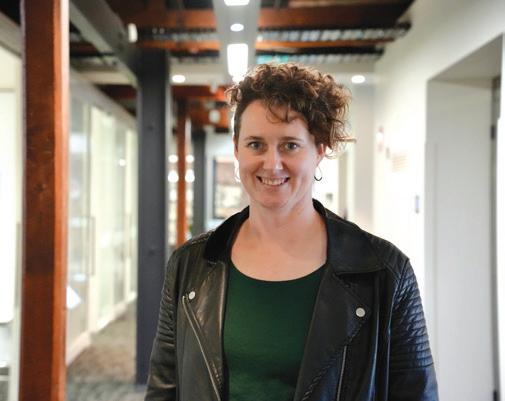
Walsh-Kemp, who teaches at the Rozelle campus, cites workload intensification as a big issue. “We’re hoping to get some change around things that are just creeping in as custom and practice,” she said.

Walsh-Kemp is keen to welcome new members to the St Aloysius chapter. “It’s a year of bargaining for our new multi-enterprise agreement and if staff want to have a voice, I encourage them to join the union,” she said. “I like to remind my colleagues that we are the union, and we have strength when we stick together.”
Walsh-Kemp sees union membership as every bit as important as NESA accreditation or membership of a professional association. “It is part and parcel of who we are,” she said. “Over the years, the union has won so many of the standards, pay and conditions we have today that are above the modern award. We won these entitlements as a union. We need to hold onto them and progress them and not revert to anything less.”
Alissa Martire has taught at Cranbrook School for 12 years in the primary school. She took on the role because she believes it matters.
“The rep’s role is important for providing another level of support at schools – it’s someone you can go to if you can’t work out your issues and you feel you’re not getting support,” Martire said. “We’re stronger together and get better benefits for the staff if we’re united.”

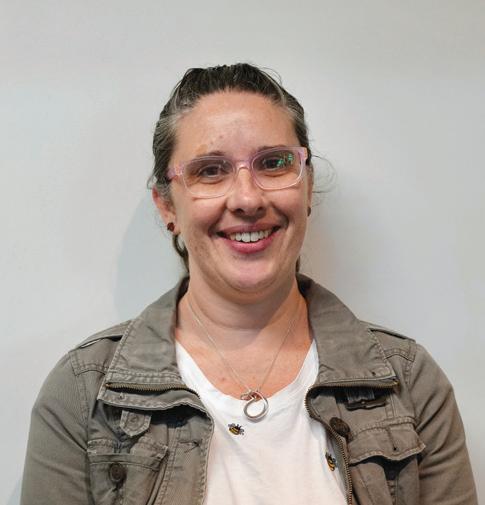
Martire says the union’s campaign for new enterprise agreements in independent schools (see pp 1, 3) is important, particularly around workloads. “It doesn’t matter who you talk to, teachers are all burning out and schools are asking more and more of teachers,” she said.
“They don’t realise the impact it’s having on staff and their wellbeing. If schools want to retain their staff and maintain the productivity of their staff, they need to look at what they’re asking them to do.”
Now’s the time for a whole new deal in independent schools, p 1 Talks under way but no offer yet from AIS, p 3
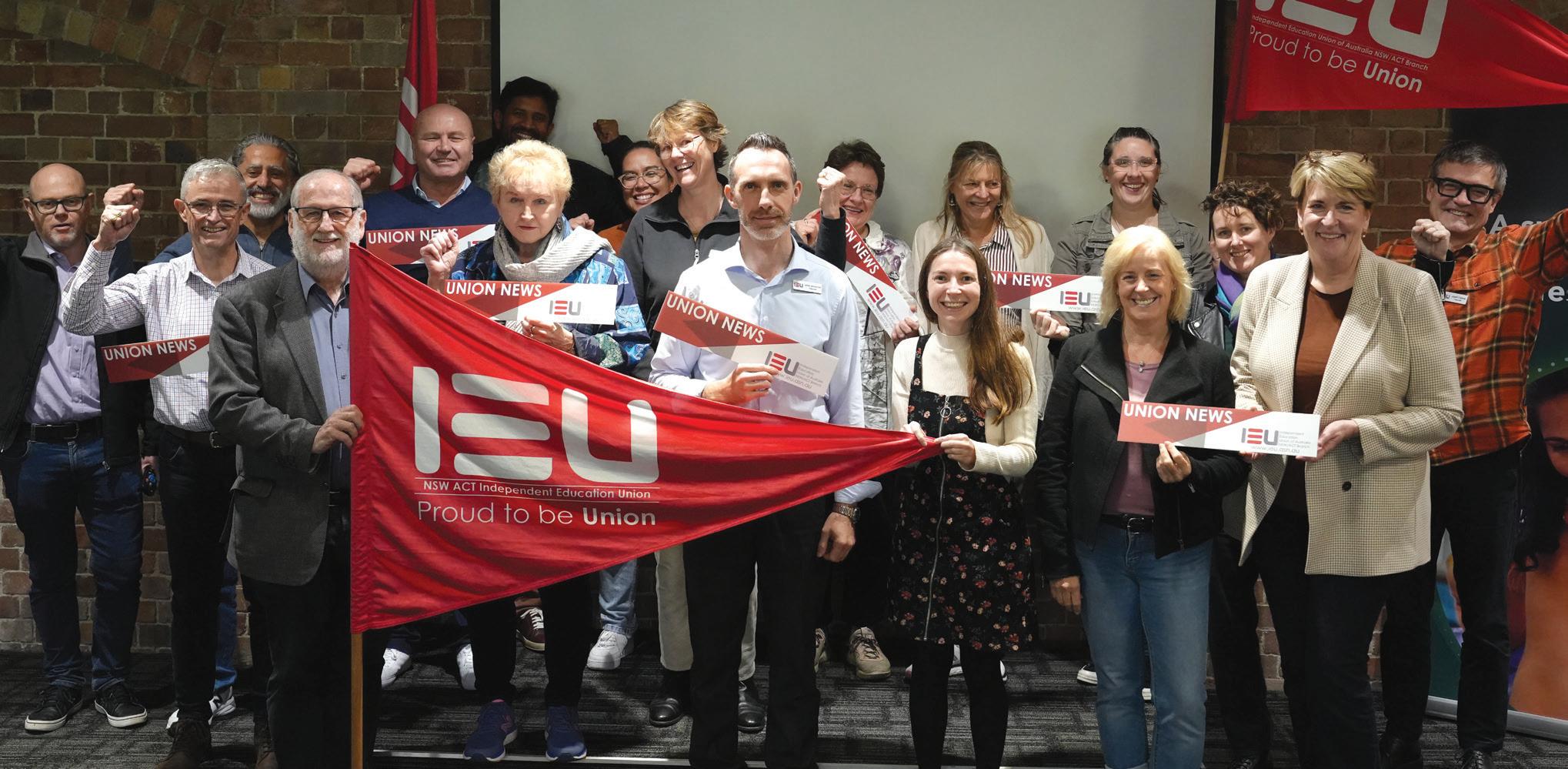

Hear our voice too!
IEU members employed in the MaitlandNewcastle Catholic Schools Office (CSO) voted to take protected industrial action in the form of a one-hour stop-work on Thursday 6 June after talks with the diocese failed to reach an agreement on salaries.
In the Protected Action Ballot released by the independent balloting agent on 24 May, an unequivocal 99 per cent of members voted in favour of taking industrial action.
What’s happening
Members employed under the CSO Staff Enterprise Agreement (including teachers, school counsellors, professional officers and support staff) have long received the same pay increases as teachers in Catholic systemic schools, including a decade under a salary cap of just 2.5%.
The employer, the Maitland-Newcastle Diocese, has now refused to pass on the 8% increase paid to teachers in October 2023.
The diocese has said it doesn’t believe an 8% pay rise is warranted for this group of highly trained and skilled professionals, and has offered an increase of just 3% (up from an initial offer of 1.46%).
The employer’s failure to match pay rises in Catholic systemic schools means some highly experienced teachers who work in the CSO are now paid less than they would be if they worked in a school, despite having systemwide responsibilities for more than 58 schools in their roles in the CSO.
Support staff who work in the CSO have also been refused the increases paid to their counterparts in schools (ranging from 6% to 20%). These increases resulted from
a successful IEU claim that rates of pay for support staff in Catholic systemic schools should be increased to match those in NSW government schools.
Salaries for school counsellors have also fallen far behind the salaries of their government school colleagues, meaning schools will struggle to retain this vital group of professionals
Understandably, members are unhappy about the CSO’s refusal to recognise and respect the complexity of their work.
Members stand together
The IEU commends the members who have represented their CSO colleagues in the bargaining. This group has done extraordinary work, giving much of their own time to lead the campaign and talk to their colleagues about the issues and encourage them to vote
The practice of some secondary schools implementing HSC-style marking processes, including pilot marking and double marking, seems to be spreading to Stages 4 and 5. We invite you to tell us what’s happening in your school.
As the union urges schools and systems to look for ways to reduce unnecessary teacher workloads, it is time to put double marking that is not required under the spotlight.
There are no NESA compliance requirements about marking processes below Stage 6, so any requests for HSC-style marking are coming from systems, schools or individuals.
“The IEU will always support efforts to maintain the highest standards in education,” said IEUA NSW/ACT Branch Secretary Carol Matthews.
“But where work intensification practices such as double marking are being required, we would want to know, where is the teacher’s professional voice in this conversation, and what tasks have been removed to enable them to undertake this additional work?”
Formative over formal
“There is no need for such processes in a standardsreferenced system,” said Professor Jim Tognolini, Director of the Centre for Educational Measurement and Assessment (CEMA), at the University of Sydney.
“Teachers build an image of a student based on data or evidence from a range of formative assessments, including observation, questioning, and completion of course work,”
Professor Tognolini said.
“More formal, or summative, assessments are important, but they should be used sparingly and should really confirm what the teacher already knows through their day-to-day teaching.”
Professor Tognolini’s advice is to focus on formative and summative assessments that are closely aligned to syllabus outcomes, then track student performance using the teacher’s image of the student against the common grade scale.
Schools are legally obliged, on request, to provide information to parents regarding a student’s achievement in
relation to their cohort. However, they are only required to advise the number of students in each of the achievement level groups. There is no requirement for schools to assign students with an overall mark or a rank within the cohort, except at the Stage 6 HSC level.
Professor Tognolini says there is little need for common assessment tasks across different classes if teachers are confidently and consistently assessing against NESA’s common grade scale, other than in Stage 6.
“Teachers can share evidence collected from different formative assessments which reflect borderline performance against NESA’s common grade scale to moderate performances between classes,” Professor Tognolini said.
Support before whole-school policy
Assistant Principal of Teaching and Learning at Christian Brothers High School Lewisham, Natalie Devenish, said time should be allocated at a departmental level “for teachers to become familiar with applying the common grade scale to course work and assessment tasks”.
Graduate teachers should be given additional support and professional learning opportunities, Devenish said. “Where a proficient teacher struggles to apply the common grade scale, an individual conversation and support will always be more effective than implementing a whole-school policy which captures everyone,” she said.
Next step
What’s happening in your school? Tell the union what’s going on. Contact your organiser or email ieu@ieu.asn.au
Reference: Tognolini, J., & Shakra, R. (2021). Give teachers a stronger voice in assessment, Independent Education magazine (IE) 51(1), 2021, pp 16-18.
Patrick Devery Professional Engagement Coordinator
in the Protected Action Ballot. The results show they are united in their push for the same increase as school teachers.
The union thanks members in MaitlandNewcastle schools, the Hunter Valley Sub Branch, and the IEU Executive, who have all moved motions of support calling on the diocese to agree to pay an 8% salary increase, retrospective to October 2023, in line with historical arrangements.
Members now have the right to take industrial action, including to stop work, the right to display campaign materials, and the right to communicate with the public and the media.
Employers heard the voice of teachers in schools. It is now time for them to hear the voice of the CSO staff.
Therese Fitzgibbon Organiser
Conditionally accredited crunch time
NESA will be following up all conditionally accredited teachers to ensure they complete their academic and proficient teacher requirements within their allocated time frame.
While there was considerable flexibility around accreditation processes during the COVID-19 pandemic, this grace period is coming to an end.
If you are conditionally accredited and there is a chance you might not complete your study and professional obligations within the time frame, we urge you to contact your organiser immediately.
If you are a supervisor or mentor for a conditionally accredited teacher, you should be working closely with them to ensure they can meet their commitments. Contact the professional engagement team for support if you need it.
The IEU offers a suite of NESA and TQI accredited behaviour management and difficult conversation courses presented by the highly regarded Dave Vinegrad.
The courses are a fantastic resource for beginning teachers and a valuable refresher for more experienced members.
NESA and TQI accredited courses running in Semester 2 are:
5 August Managing and responding to extreme behaviours (6pm–8pm)
26 August Managing difficult conversations (6pm-8pm)
9 September Behaviour management
Getting it right (6pm-8pm)
16 September Behaviour management
Keeping it right (6pm-8pm)
21 October Behaviour management
Making it right (6pm-8pm)
11 November Behaviour management
Upholding the right (6pm-8pm)
25 November Thriving and surviving for casual teachers (6pm-8pm)* *TQI accredited only Accredited
ieu.asn.au/events/


After months of negotiations the IEU and KU Children’s Services members have come to an agreement.
Despite including higher pay, KU’s earlier offers were rejected by 90 per cent of members because they did not include increased administration time for directors and educational leaders.
Prior to the new agreement, most KU directors taught in the classroom in addition to managing their ever-increasing responsibilities as directors, with as little as one day of office time each week in preschools, or a minimum of two days per week in childcare subsidised services.
With the creation of the role of educational leader in 2012, KU determined that their directors would be the educational leader of their services, but did not allocate any additional non-contact time for them to fulfil the significant responsibilities of this role.
Some KU teaching directors were responsible for documenting, planning and evaluating the learning of 50 or more children each week, with 40 minutes of programming time on each of the days they worked directly with children.
During previous enterprise agreement negotiations, the issue of non-contact time was raised by the IEU and our delegates as the most important issue for our members.
The introduction of Start Strong in 2017 caused a huge upswing in administration. Nevertheless, KU rejected the IEU’s claim for increased administration time for directors and educational leaders. Ninety per cent of members rejected KU’s offer, saying they would be willing to take industrial action on this issue.
KU returned to the bargaining table in early May, finally agreeing to meet the IEU’s claim for an increase in directors’ office time – a minimum of two days per week for teacher directors who currently receive one day per week and an increase to three days per week for teacher directors who currently receive two days per week.
In addition, KU agreed that directors would receive four hours per week for their educational leader responsibilities.
KU’s final offer
4% increases to salaries and allowances in 2024, 2025 and 2026
• two days minimum office time for directors each week
(directors that previously had two days per week will now have three days office time)
15 discretionary days for directors per year (these days can be shared with teachers to complete Transition to School Statements)
four hours per week for the educational leader role
KU directed meetings will be reduced to four hours per year and pre-approved time in lieu will remain at 16 hours per year
five hours programming time for full-time teachers
two child-free days per year
five days paid leave for both Declared Disaster Events and Declared Pandemics
two days paid Cultural Leave for Aboriginal and Torres Strait Islander employees
20% discount on the gap fee for KU employees whose children attend KU long day care services. gender affirmation leave.
Recommending a ‘yes’ vote
KU’s final offer addresses the issues raised by our members and provides for generous pay increases for the life of the agreement. The IEU is pleased to recommend a ‘yes’ vote to members when the enterprise agreement is finalised later this year.
The union thanks our members for standing strong together. We could not have achieved this without your unwavering support.
If you have non-member colleagues at your workplace, it is time to invite them to become part of the solution by joining the IEU.
Lisa James Organiser
Karin Watts is celebrating both 40 years of IEU membership and her 40-year career at Norwood Community Preschool.
Watts spent much of her teenage years babysitting, and so she set her sights on a career as a teacher.
After a false start at one centre where things did not go to plan, Watts found her ideal workplace in Sydney’s north-west, where she still works today.
She’s proud to have been a teaching director at Norwood Community Preschool for 40 years.
“I enjoy the privilege of being the children’s first teacher and mentor for their future learning,” she said. “I have met and worked with so many amazing children, families and colleagues.”
In the early years, Watts remembers that the centre had only 15 children per day, and they attended only staggered mornings rather than full days.
Watts finds working in a not-for-profit community preschool very satisfying.
“Parent involvement is pivotal to the viability of the preschool. In a rapidly changing world, I feel privileged to be viewed as ‘constant’ Miss Karin at Norwood.
“Teaching second generation children provides a historical connection,” Watts said.
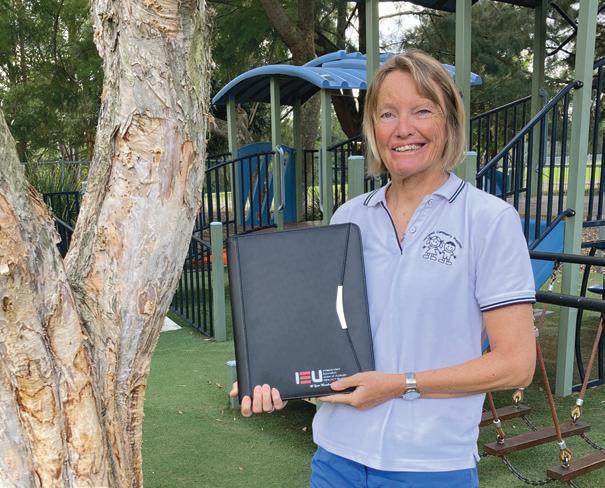
Inside, Norwood had one small room, but the preschool boasted an enormous backyard where the children could play and explore, and most activities were held there.
“It has seen many changes over the years,” said Watts, and today Norwood “is a more complete structured service”.
The preschool now operates out of a Hornsby Shire Council building.
“Norwood has always been fortunate to have long-term dedicated staff who work above and beyond, embracing the values of a community-based preschool.”
And that dedicated staff includes Watts’s job-share teaching partner Beverley Gowenlock, who has worked alongside her for 23 years.
Gowenlock and Watts were groundbreakers in introducing job-sharing to the preschool when it was a new concept.
Watts’s role has changed in recent years, she’s now a nonteaching director, which involves more administration and accountability, she said.
“However, I still love engaging with the children and families during the day and filling in as a teacher during staff absences.”
No matter what her work involves, Watts values her IEU membership. The union is “a great support for early childhood education and continues to lobby on our behalf”, she said.

There is progress in the quest for multi-employer/whole-of-sector agreements to address pay and conditions in the ECEC sector. Transformative change is within reach.
Long day care – supported bargaining update
The long day care proceedings are being finalised with the assistance of the Fair Work Commission.
The IEU’s claim (with the Australian Education Union and United Workers Union) for a fully funded 25% pay rise and improved conditions for teachers and educators is being considered by the federal government.
The government has advised it will consider the outcome of the Annual Wage Review before advising the IEU of their funding position.
The review was handed down on 3 June, providing for a 3.75% pay rise in your award from 1 July. The government now needs to step up and fund substantial pay rises for ECEC teachers.
The federal government has committed to funding these wage increases pending the outcome of negotiations. On budget night (14 May), Federal Treasurer Jim Chalmers said, “In the wages system we have a big commitment to making sure that workers in the care economy, predominantly women, are paid fairly for the important work that they do, but there are a couple of processes under way that we don’t want to preempt, and so we make a responsible provision.”
Community preschools – supported bargaining update
The IEU is progressing an application to seek a supported bargaining authorisation for preschools across NSW. Thanks to all our fantastic preschool teacher ambassadors and our preschool teacher members who are uniting for change, our voice is being heard. We need a substantial pay rise and equity with teachers in schools.
Parent management committees are now coming on board to stand with preschool teachers and demand the NSW government fund improved pay and conditions in the preschool sector.
A supported bargaining application will be lodged in the Fair Work Commission in the coming weeks.
If you’d like to get involved in our ECEC campaign or just need more information, email IEU organiser Kate Damo on kate@ieu.asn.au.
Don’t
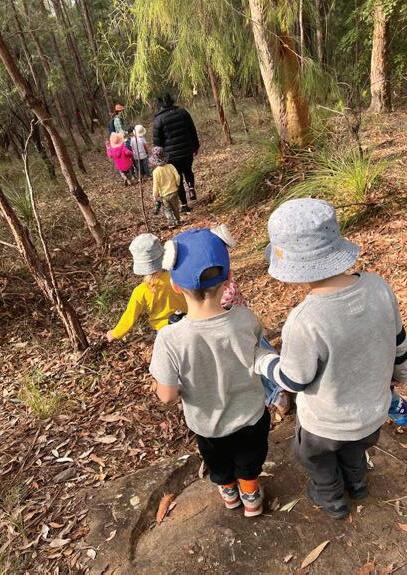
Vol Going bush is good for
If you are an early childhood education and care (ECEC) member, you should have received the second Bedrock magazine for 2024 with this edition of Newsmonth Inside we outline the industrial reforms introduced by the Labor government that should have positive benefits in highly
feminised sectors such as yours.
Taking advantage of these reforms, the IEU is seeking significant pay rises for teachers in communitybased preschools in NSW, with its new campaign Unite for Change.
We also visit Blaxland Preschool, a unique centre. Nothing stops the teacheres and students getting out into the bush.
Does too much screen time limit a child’s language development? According to new research, it does. We explain more in this issue.
With the current workforce shortage, getting more men to work in the early childhood sector seems like an obvious answer. But how can this be achieved?
There are lots of other wonderful reads on topics such as communication tips and wellness in the workplace to explore.
We hope you enjoy it.
Thirty years ago, the Independent Teachers’ Association changed its name to the more inclusive Independent Education Union to reflect our coverage of support staff. As we celebrate World Support Staff Day this year, meet Susan Ross, who’s both a teacher’s aide and an IEU rep.
Susan Ross is a teacher’s aide at St Leo’s Catholic College Wahroonga, where she’s been an IEU member for almost 18 years and a rep for more than a decade.
Ross assists teachers with implementing programs and prompts students to complete their tasks in class. “We’re not there for behaviour management – that’s the teachers’ job,” Ross said. “One of my bosses many years ago said we’re ‘the good fairies’ of the classroom.”
Personal connection
Ross’s role as a teacher’s aide enables her to build a unique and supportive relationship with the students. “You can cajole them and help them in so many different ways,” she said.
Making a difference is what Ross likes most about her role. “I love that lightbulb moment when you can see a child you’re trying to assist finally get something – the joy on their face when they get it is just unbelievable.”
Ross loves working with students in tech classes, PE and maths. “I particularly enjoy the practical subjects because you see kids who are not especially academic, they get into a non-academic subject like tech or PE and they just thrive – you can see they will have a career like a carpenter or a plumber because school’s just not for them,” she said.
Taking the rep’s baton
Like many members, Ross joined the IEU when a colleague invited her to, then she followed in that colleague’s footsteps to become the rep at St Leo’s. “A very good friend who was a librarian convinced me of the benefits of being a union member,” she said. “And then when she left, she handed me her little red folder and I’ve been the union rep since.”
The benefits of union membership are “absolutely brilliant”, Ross said. “If you’ve got any questions, union support is just a phone call or email away. Knowing you have that support when work can be a bit difficult. And knowing that you have rights and someone backing you. It really changes things,” she said.
World Support Staff Day on 16 May was an important day to recognise and celebrate our invaluable colleagues.
“I love that lightbulb moment when you can see a child you’re trying to assist finally get something – the joy on their face is unbelievable.”

“You just have to go with the flow. Those kids are very talented, but they don’t get recognised because their talent is not so academic. You have to give them that recognition because that’s their skill.”
Ross once supported a student who hated algebra. “So I made up a song and dance about how I loved algebra – ‘I love algebra, it’s so logical’, it went. Well I bumped into that student many years later at the local shops, and he started singing the song to me.” Ross was visibly moved by having made such a lasting impression.
While she has worked with thousands of students over the years, Ross still loves establishing a personal connection with each. “I see ex-students around all the time, and they always want to chat, which is a lovely feeling,” she said.
In 1994, the IEU changed its name from the Independent Teachers Association to the Independent Education Union, reflecting our full coverage of support staff.
The ITA reached agreements with the Federated Clerks Union and the Federated Miscellaneous Workers Union, enabling it to cover all staff (other than domestic staff) in non-government schools, and the ITA Council voted to change the name to the NSW Independent Education Union on 13 August 1994.
ITA membership stood at a healthy 16,265 (about half of our current membership).
The top rate of pay for Catholic systemic teachers at that time was $41,385; for those in schools represented by the Association of Independent Schools, it was $42,181.
Some issues persist: the ITA was campaigning against work intensification, described by then Deputy General Secretary Patrick Lee as the “colonising of your life”.
Christian Brothers schools became the first nongovernment schools in NSW to agree to paid maternity leave. Six weeks paid maternity leave was then introduced into Catholic systemic schools from July 1994. Long service leave also increased. Members decided to forgo 1.3% in salary increases to achieve these wins.
Corporal punishment in schools was still permissible in NSW (although the IEU’s federal union had passed a resolution against it in 1984). In Queensland it was for boys
As the rep at her school, Ross has a direct approach with non-members. “Probably in the last few years I’ve been a little bit firmer,” she said, noting that she reminds male teachers who take paid parental leave that “the union fought for it”.
Proud union gains
Ross is proud of the pay rises the union and its members achieved during the 2022-23 Hear Our Voice campaign. “The teacher’s aides have just had a massive pay rise to be on par with government schools,” she says. “Without the union, it wouldn’t have happened.”
She remembers the power of thousands of members taking collective action not just in rallies in Sydney but throughout NSW. “One of my colleagues and I, we were there at Sydney Town Hall in our gold t-shirts and chanting – it was electrifying,” she said.
“There are definite benefits of being a union member,” she said. “You meet other people and you can speak to them on a different level that doesn’t actually involve schoolwork. Just having that conversation with people makes a difference.”
Monica Crouch Journalistonly. Victoria, the Northern Territory, and Tasmania allowed it. UNICEF criticised Australia for not having nationwide bans against the physical punishment of children. Age discrimination became unlawful.
Church, state, federal and international arenas
A federal Labor government was at the helm in 1994, with Paul Keating in his last two years of Prime Ministership. He retired in 1996 when the Howard Government got in on a landslide. The federal Education Minister in 1994 was Simon Crean and the NSW Education Minister was Virginia Chadwick. John Fahey was the Premier of NSW.
Time magazine’s Person of the Year was Pope John Paul II.
According to Time, “This Pope has modernised the papacy and internationally spread his reach in massive gatherings of Catholics and frequent consultations with heads of state.”
The Church of England ordained its first women priests.
The Nobel Peace Prize went to Palestinian leader Yasser Arafat, Israeli statesmen Shimon Peres and Israeli Prime Minister Yitzhak Rabin “for their efforts to create peace in the Middle East”.
The Siege of Sarajevo and the Rwandan genocide were occurring. The Rwandan genocide is one of the most notorious modern genocides. During a 100-day period between April and July 1994, nearly 1 million ethnic Tutsi and moderate Hutu people were killed as the
The day is an initiative of Education International, the global federation of more than 380 education unions, of which the IEU is a proud member.
Everything that happens in our schools that enables teachers to teach and students to learn starts with support staff. They are the engine room of schools, and we’d like to say a big thank you to all support staff in NSW and the ACT.
In 2022-23, the outcomes achieved by Catholic systemic sector support staff for greatly improved pay and conditions has set a benchmark for all support staff in non-government schools. Many support staff in independent schools are now earning less than their colleagues in Catholic systemic schools.
As negotiations begin for new enterprise agreements in AIS schools, the IEU invites all support staff in these schools to join th IEU so you too can have your voice heard for a better deal. We are always stronger together.
international community and UN peacekeepers stood by.
The first democratic elections were held in South Africa and Nelson Mandela became President. The allied occupation of Berlin finally ended.
Fashion, culture and sport
Fashion-wise it was tartan everything, from flannel shirts to pleated skirts to ripped jackets. Grunge was huge – think Nirvana, Pearl Jam, Soundgarden, Mudhoney. Flannel, ripped jeans, combat boots and messy hair were all the rage.
In the ARIA Music Awards, Album of the Year and Single of the Year was The Honeymoon Is Over by The Cruel Sea (both single and album had the same name).
In the sporting arena, Canberra won the NSWRL Premiership. The FIFA World Cup was held in the United States and Brazil became the first team to win four times.
The Academy Award for Best Picture in 1994 went to Forrest Gump.
The Booker Prize went to How Late It Was, How Late by James Kelman.
The Australian of the Year was Ian Kiernan OAM, the founder of Clean Up Australia.
RIP Nirvana front man Kurt Cobain, Brazilian Formula One driver Ayrton Senna and North Korean leader Kim Il Sung. David Towson IEUA NSW/ACT Branch Deputy Secretary
Friday 13 September
University of Technology Sydney Aerial Centre

Keynote speaker: Craig Foster AM, former Socceroos captain and human rights activist
Our personal and professional development sessions and workshops on a wide range of topics.

Is the annual goal-setting and professional development process at your school too demanding? Get the facts from the AITSL Australian Teacher Performance and Development Fact Sheet, developed in collaboration with the IEU in 2024.
The IEU has worked with the Australian Institute of Teaching and School Leadership (AITSL) to clarify what is – and is not – required for compliance with the annual goal-setting and professional learning process in the Australian Teacher Performance and Development Framework.
The ATPDF was implemented in 2012. As with many other policies and frameworks, the quantity and type of documentation demanded of teachers has intensified exponentially over time, thereby increasing teacher workloads unnecessarily.
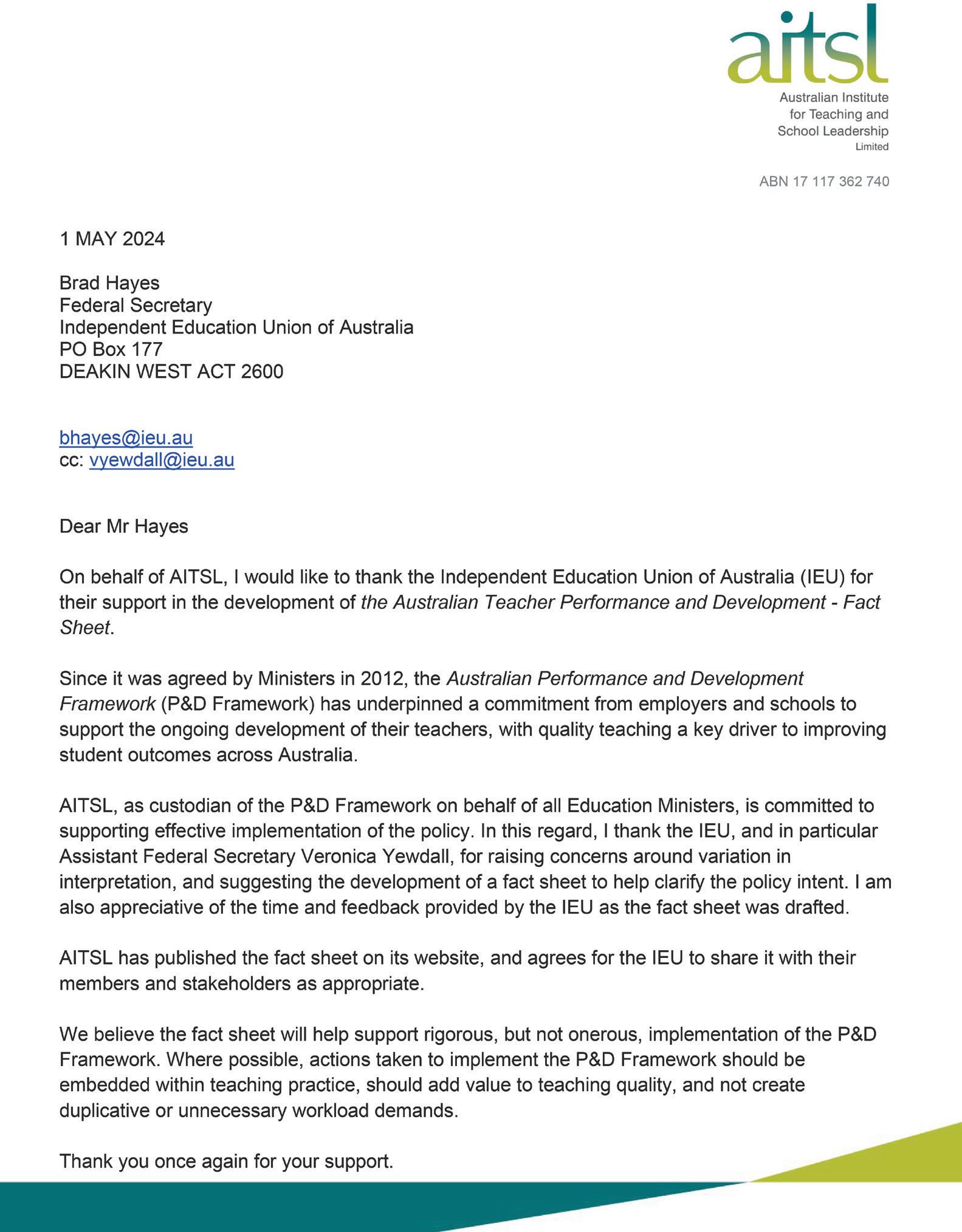


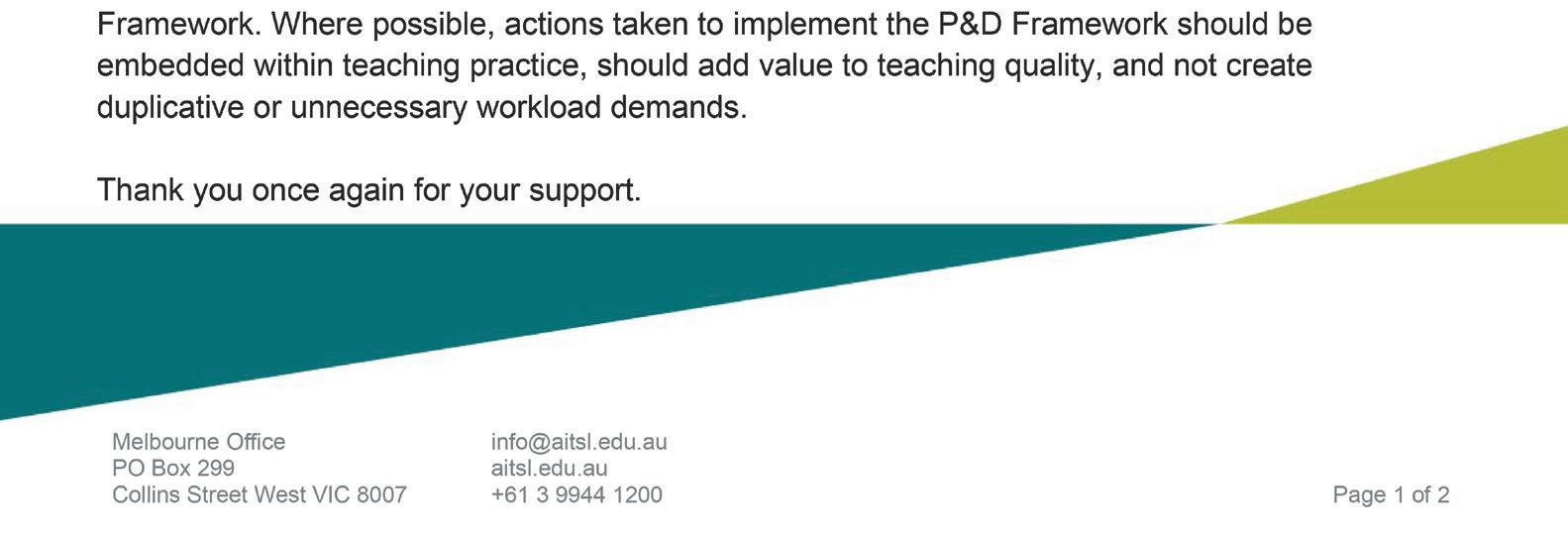
Members identify excessive workloads associated with the annual goal-setting and professional development process, which occurs under various names in each school.
The IEU investigates the origins and authority for any requirements related to the annual goal-setting and professional learning process and identifies the Australian Teacher Performance and Development Framework overseen by AITSL.
The federal office of the IEU seeks to collaborate with AITSL on a Fact Sheet to clarify what is and is not required for compliance with the ATPDF.
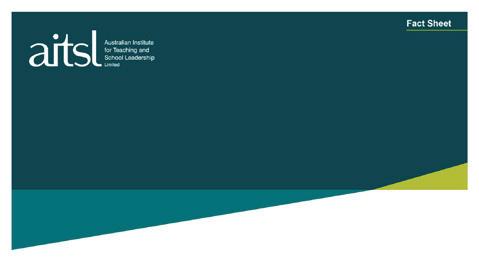
The AITSL ATPDF Fact Sheet is published in April 2024.
The Australian Teacher Performance and Development Framework (P&D Framework) places the improvement of teaching at the centre of efforts to improve student outcomes in every Australian school. The P&D Framework requires that teachers:
• know what is expected of them
• receive frequent, and useful feedback on their teaching
• access high-quality support to improve their practice.
The P&D Framework aims to promote genuine professional conversations that improve teaching. It should provide a structure that builds on and strengthens the various activities teachers are already engaged in rather than operate as a disconnected and administrative process.
The P&D Framework was endorsed by Education Ministers in 2012 with agreement to implement the following essential elements:
• All teachers have a set of documented and regularly reviewed goals related to both performance and development, and ways of measuring progress towards them, that are agreed with by the principal or delegate.
• All teachers are supported in working towards their goals, including through access to high-quality professional learning.
• Evidence used to reflect on and evaluate teacher performance should come from multiple sources.
• All teachers receive regular formal and informal feedback on their performance. This includes a formal review against their performance and development goals at least annually, with verbal and written feedback being provided to the teacher.
The P&D Framework highlights what is required to establish an effective approach to performance and development, outlining characteristics and the culture required to sustain improvements. The cyclical nature of the performance and development approach ensures a deliberate, structured, and longterm approach to improving teaching and meeting the learning needs of students to achieve.
While the implementation of the P&D Framework is the responsibility of systems, sectors and schools, AITSL strongly encourages school staff responsible for requesting and gathering evidence not to create unnecessary documentation. Drawing evidence from teaching practice is more authentic and reduces workload.
The P&D Framework is not an alternative to the performance management of staff or an employer’s concern about unsatisfactory performance. This process should be managed as a separate process to implementation of the P&D Framework, adhering to any relevant legislation and employment agreements.
Implementing the P&D Framework as intended will have the following benefits for teachers and school leaders:
Benefits for teachers
• structure to support teacher and school improvement aimed at improving student outcomes
• flexibility to align with school improvement goals
• increased professional growth through instructional coaching
• enhanced professional satisfaction
• formal recognition of professional achievements
• access to networks through school and system wide collaboration.
Access to and participation in: relevant professional learning
• targeted career goal setting effective reflection and feedback collegial networks
Benefits for school leaders
• structure to drive teacher and school improvement aimed at improving student outcomes
• flexibility to align with school improvement goals
• promotes collaboration and collegial endeavour
• encourages leadership at all levels
• promotes a shared commitment to excellence
• provides a shared understanding of effective teaching.
Judgments about the effectiveness of teaching have the greatest validity when based on multiple sources of evidence. Evidence used to reflect on and evaluate teacher performance should include:
• data showing impact on student learning
• information based on direct observation of teaching
• evidence of collaboration with colleagues.
Examples of evidence that can be used to reflect on teacher performance include:
• formal or informal student assessments demonstrating impact of teaching on student learning
• evidence from an observation of teaching, such as notes from a peer observation discussion
• evidence of the teacher’s impact on colleagues and the school as a whole, such as staff feedback after a professional learning session
• teacher self-assessment
• feedback from students, peers, supervisors and parents
• evidence of participation in professional learning and reflection on its impact.
Note, this is not exhaustive or intended to act as a checklist but instead, provide an idea of the multiple forms evidence can take.
Term/
Focus area This could look like …
Performance
Goal setting
• a demonstration of growth and development through informal measures such as:
• peer or lesson observation notes video clips from team teaching unit/lesson plans demonstrating use of a variety of teaching strategies.
• a process that addresses both teacher performance and development and ties together the various activities teachers are already engaged in. Effective goal setting can consist of the following characteristics:
• brief and concisely displayed (2-3 pages) only need to be a small number of challenging and achievable goals to be effective (2-4 goals is normally enough) aligned to school plans and school-wide approaches
Evidence • an ongoing collection of materials taken from ordinary duties/participation built upon through routine. Effective evidence can come from teaching activities such as:
• written reports lesson/unit plans formal and informal student assessment activities
• student work samples development of individual learning/education plans
• effective evidence can come from multiple sources, such as:
• peers student data parent feedback
• self-reflection
• be informal and arise from self-reflection, for example, it could include:
• evidence of collaboration with colleagues lesson observations (either own lessons or from peer observations)
• be built through team/s observation and evidence, such as: record of report moderation between teaching colleagues minutes of professional committee meetings evidence of online discussions, blogs, courses, and professional learning communities.
Feedback • a continuous feedback cycle is established as part of a school-wide culture and shared commitment toward understanding what effective teaching looks like. For example, this might look like:
• a professional discussion with a colleague brief reflection notes following a lesson
• watching a recording of a previously held lesson.
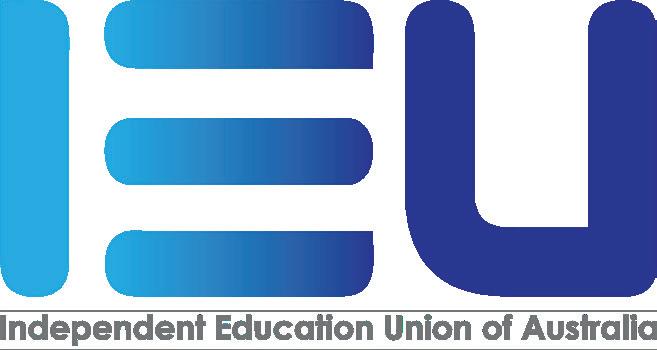
Processes that are likely to be duplicative or excessive …
• a formal review including external assessors
• classroom observations across an entire staff that are frequent or summative and do not involve a collaborative planning process (i.e. not focussed on the development of teaching practice).
• a separate/additional process involving extensive paperwork outlining a wide-ranging array of goals
• documentation to explain the alignment between a school’s annual improvement plan and a teacher’s plan, where the alignment is clearly evident.
• a dense portfolio including additional work designed for the purpose of the portfolio only (established as a one off)
• narrative or explanatory texts that describe evidence that is clearly understood by the professional reader or audience
• the collation of evidence into a single document or location.
• occurs only in performance evaluation processes
• a performance management or counselling process across a whole staff
• written teacher responses to reflective questions or prompts, especially in preparation for a professional discussion with a colleague or member of the leadership team.
Emphasis (bold) added by the IEU
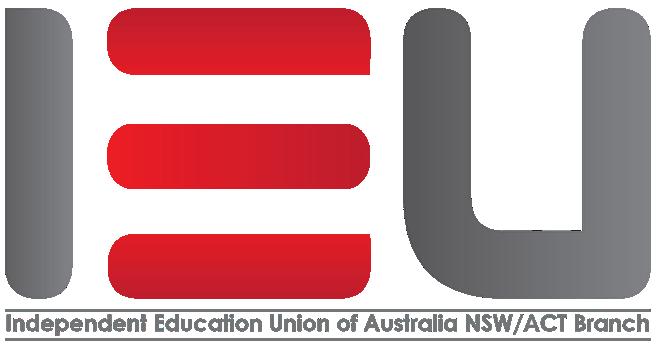
What should you do if you’re directed to undertake duplicative or excessive practices related to the ATPDF?
The IEU has written to all NSW/ACT non-government school employers alerting them to the ATPDF Fact Sheet. The Fact Sheet provides clear advice on what is required to comply with the policy intent of the ATPDF, and identifies specific practices that are duplicative or excessive. The Fact Sheet discourages unnecessary documentation and asserts that the ATPDF should be anchored in a teacher’s ordinary duties.
It is encouraging to see a number of employers have already responded positively to the arrival of this Fact Sheet.
“To advance our mutual objective of alleviating unnecessary workload burdens on teachers and school leaders, I will ensure the Fact Sheet is disseminated to teachers and school leaders through our Gateway newsletter, which reaches both CEO and school staff. Furthermore, I am pleased to inform you that the P&D Framework will be included on the agenda for discussion at the upcoming Term 2 IEU/CEDoW consultative committee meeting. I take this opportunity to express gratitude for your letter and appreciate the clarified guidance resulting from the collaboration between the IEU and AITSL.”
Ask: Who requires this documentation or practice?
“This is wonderful! Appreciate the IEU’s efforts in securing this document.” Christian Schools Australia
“We are very supportive of the TPD Framework and AITSL Fact Sheet. We also appreciate the IEU’s support of its contents. We are delighted to see very close alignment with our ongoing investment in system initiatives to support and build the capability of our teachers, ensure balanced workloads, and maximise the learning growth of every student.”
Draw the attention of the school leadership team to the AITSL ATPDF Fact Sheet. Consult your union organiser and meet as a chapter and/ or sub branch to request a review of practices based on the official advice in the Fact Sheet.
Invite non-members to join the union and support their colleagues in this important work.
Eliminate duplicative and excessive practices, one Fact Sheet at a time.
If you believe the current ATPDF process in your school or system is unnecessarily onerous, talk to your colleagues and contact your organiser to discuss options.
The IEU has requested that employers consult with IEU members as they look to evaluate and amend their ATPDF processes.
Let us know what’s happening in your school by contacting your organiser.
An ongoing process
The ATPDF Fact Sheets form part of an ongoing process the IEU has undertaken with a number of government and regulatory authorities, with a view to addressing, at a structural level, processes that lead to excessive teacher workloads.
The NCCD Fact Sheet
The first of these was the NCCD Evidence Fact Sheet. The IEU approached the Department of Education to raise the concerns of IEU members struggling to manage unsustainable workloads and who were alarmed by the impact of excessive documentation on the delivery of practical support for students with disability, the purpose for which the NCCD was designed. The NCCD Evidence Fact Sheet addresses unnecessary practices and was developed in a collaboration of the federal Department of Education and the IEU. In many schools, the NCCD Evidence Fact Sheet has been used to review and dispense with unnecessary processes and documentation.

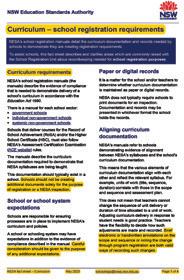
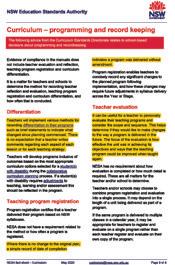
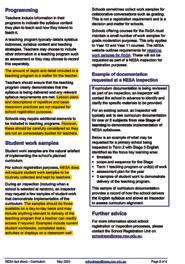

• IEU NESA fact sheet: bit.ly/ieunesacompliance
• NESA fact sheet: bit.ly/nesafactsheet2023
The AITSL ATPDF Fact Sheet
The AITSL ATPDF Fact Sheet continues this important work of aligning the official advice from regulatory authorities with the on-the-ground experience for teachers, ensuring that systems, schools, or individuals within schools are not inadvertently creating workload issues for teachers and support staff: bit.ly/AITSL-ATPDFfactsheet
Australian Children’s Education and Care Quality Authority (ACEQA) Compliance Processes
The IEU is currently working with ACECQA with a view to bringing some much-needed balance to the administrative and work processes in the early childhood education and care (ECEC) sector. Stay tuned for more information.

IEU NCCD fact sheet with
The NESA Curriculum Fact Sheets
The IEU advised NESA that members were being asked to undertake many administrative processes in the name of ‘compliance’, despite NESA confirming it did not require many of these processes at all.
At the union’s urging, NESA produced its School Registration and Programming and Record Keeping Fact Sheets, which clearly state what is and, most importantly, what is not required for compliance purposes.
Members have reported that the NESA Fact Sheets are beginning to have a positive impact in reducing unnecessary workload practices.
The common theme running through all these documents is that a teacher’s professional judgement should be paramount in determining what constitutes an appropriate level of documentation for teaching and learning, administrative, and data collection processes.
The IEU is constantly working with employers, regulatory authorities and governments to achieve
and professional outcomes for
Encourage your colleagues to join their
to ensure the voice of the profession is heard at
and in every forum.
The 2024 federal budget continues repairs to the nation’s education system and delivers much needed relief to IEU members and their families struggling with persistent cost-ofliving pressures.
The 2023 and 2024 budget commitments, combined with groundbreaking reforms to workplace laws, have gone some way to address the years of disrespect shown to IEU members.
The crucial work undertaken in our schools and early childhood education centres deserve our nation’s complete support.
Many complex challenges remain. We need more action on teacher workload and our colleagues in state schools are still denied 100 per cent funding of the Schooling Resource Standard (SRS).
However, the budget does deliver important changes in many areas of need in our schools and workplaces:
Recognising the vital role of early childhood education: The government’s commitment to help fund professional pay rates for early childhood education workers is a gamechanger for the sector. The IEU has been part of the nation’s first supported bargaining process and the government’s provisional funding to support higher wages will make a huge difference to the early years workforce.
New funding for the National Teacher Workforce Action Plan (NTWAP):
Targeted funding to support the continued rollout of NTWAP actions includes expansion of the National Teacher Resources Hub as well as the First Nations Teacher strategy to attract and retain more First Nations teachers.
Cost-of-living support: Teachers and support staff will be some of the main beneficiaries of the revised ‘stage 3 tax cuts’ from 1 July.
Beginning teachers are set to receive up to $1700 and experienced classroom teachers

up to $2679. The average tax cut for all workers will be around $1900. Combined with wage increases won through their collective bargaining campaigns, IEU members stand to receive significant financial support in coming months to help with cost-of-living pressures.
Paid teacher practicum placements: Our union has campaigned to end ‘placement poverty’ suffered by many student teachers.
The new Commonwealth Prac Payment (CPP) is long-overdue and an essential element of the workforce planning needed to forge our next generation of teachers.
Cuts to HECS-HELP debts: New teachers have been trapped with growing student debts as indexed increases exceed wage outcomes.
New limits on the rate of indexed increases to HECS will provide much needed financial relief for teachers as they begin their new career.
Super paid on parental leave: The retirement incomes of women still lag well behind their male co-workers. The government’s plan to pay super on government funded parental leave will help reduce the retirement pay gap that relegates many women to poverty after work.
Escaping domestic violence: The IEU was one of the first to secure paid domestic and family violence leave for employees through collective bargaining. The government’s $925 million emergency support payments for victimsurvivors to escape violence is another important step towards a safer community.
Affordable housing for essential workers: Like so many in the community, education staff are often unable to live and work in their local area due to soaring rent and property prices.
$12.3 billion in new housing programs begins the long path back to housing affordability for essential workers.
Brad Hayes IEUA Federal SecretaryThe federal government has announced that student teachers, social workers, nurses and midwives will be eligible for a new Commonwealth Prac Payment while on placement.
The scheme, which was unveiled ahead of the May budget, is an effort to address ‘placement poverty’ – the financial hardship many students experience while balancing mandatory unpaid placements with the rising cost of living.
In July 2025, eligible students will receive a means-tested payment of $319.20 a week while on placement. “We’re funding support for placements so our future nurses, teachers and social workers can gain the experience they need,” Prime Minister Anthony Albanese said.
Over the last year, calls for paid placements have grown louder. In February, the Australian Universities Accord, a review of higher education, recommended that the government fund paid placements.
A nationwide campaign from grassroots collective Students Against Placement Poverty (SAPP) drew attention to the issue, as well as support from unions. Representatives from the IEUA NSW/ACT Branch stood alongside students at a rally in Sydney in November 2023.
Last year, the IEUA, the IEU’s federal union, called for financial support for education students undertaking their placements. The union has welcomed the government’s announcement, with Federal Secretary Brad Hayes calling it “a crucial step towards improving teacher graduation rates and building a more secure pathway for new teachers preparing to enter the profession”.
Early childhood education student and IEU member Rachel Peninton is also pleased to see the government funding placements.
“I think it’s a good start,” said Peninton, who

has worked in the early childhood education and care (ECEC) sector for almost 20 years.
The single mother studies part-time while teaching at a preschool and working as the centre’s Co-Director and Educational Leader. Her first practicum involved a month of unpaid full-time work. She told her employer she didn’t think she’d be able to make it through unpaid.
“I got to the point where, I mean, I’ve got a mortgage, I’m a single parent, so I can’t afford to not get a wage,” said Peninton.
Peninton’s employer agreed to pay her regular wages while she was on placement. She knows others aren’t so lucky, with placement poverty causing some education students to drop out, exacerbating the teacher shortage.
“You have services that don’t have enough qualified staff who have really dedicated, passionate professional people that just can’t finish that degree, which is a real shame, especially in rural areas,” Penington said.
While she is glad the government will fund paid placements, Penington doubts she would qualify under means-testing, and believes the payment is insufficient. A few hundred dollars a week “isn’t going to pay my mortgage, my electricity bills, my food bills. It’s not enough to live off”, she said. Still, Peninton is glad that her sector is included in the program. The Department of Education confirmed to the IEU that early childhood education students will be eligible for the new payments. Students in some disciplines, including medicine and psychology, are not included.
The IEU supports paid placements for students studying education degrees and those studying to enter other essential services.
Lucy Meyer JournalistAs the health fund for the education community, we help over 370,000 education staff and their families navigate life’s ups and downs.
So why not see what we can do for you?

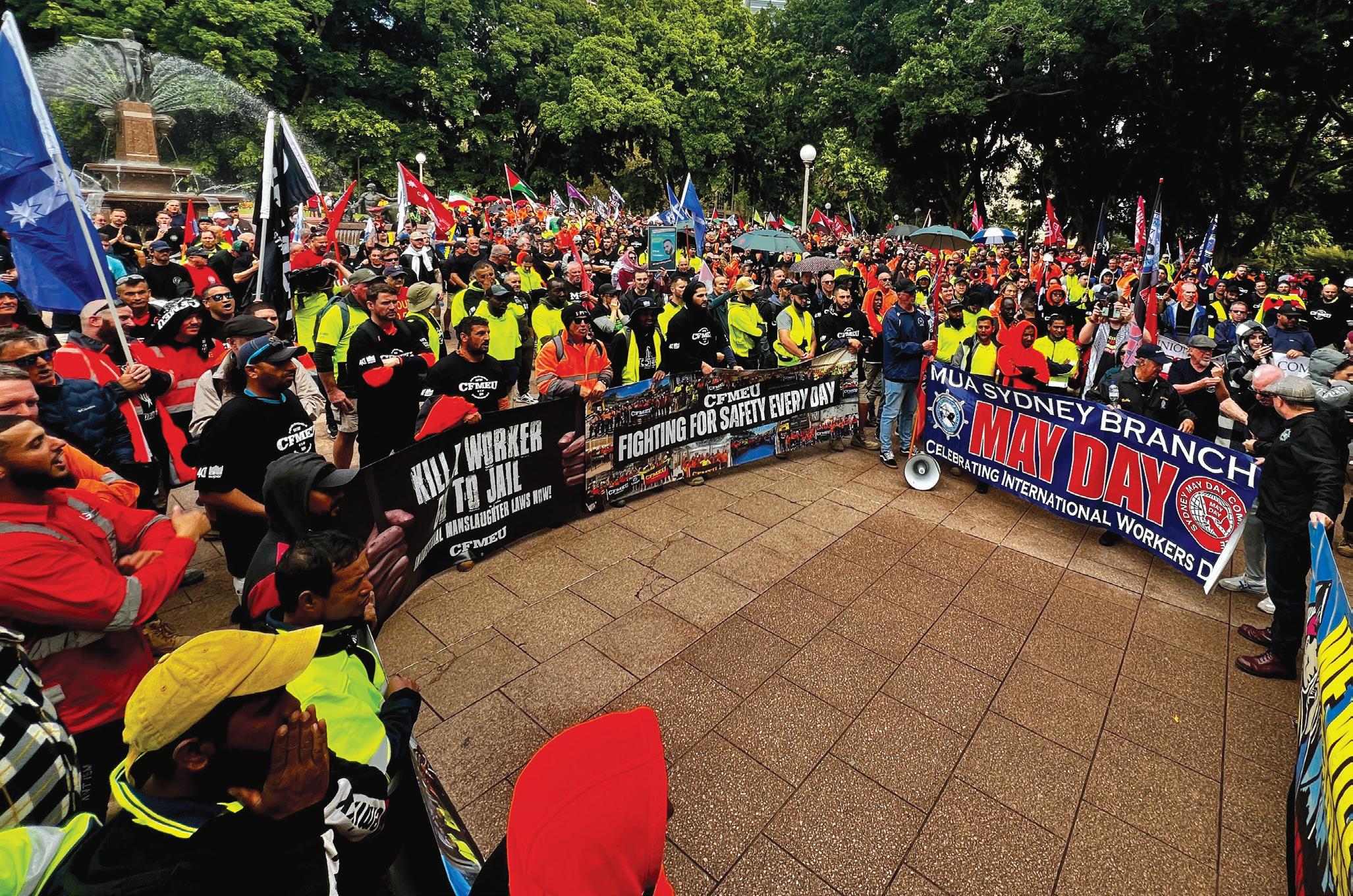
From Newcastle to Wollongong, Sydney and Canberra, IEU members attended May Day events to celebrate the achievements of the union movement in Australia and around the world.
In Sydney, the IEU gathered in Belmore Park near Central before marching alongside thousands of unionists through the bustling city streets and on to Hyde Park.
The chants were loud, with calls for NSW to pass industrial manslaughter laws (see p 15), a strong theme from the unionists leading the rally. “Kill a worker, go to jail!”
Not even driving rain could dampen the sound of union power ringing through the streets of Newcastle at the 2024 May Day parade. Unionists and their families chose to hold union banners rather than umbrellas, demonstrating their commitment to the movement’s proud history.
The IEU joined the march from the Newcastle Museum to the Train Sheds where speeches again called for the NSW government to pass industrial manslaughter laws.
May Day recognises the history of working people organising and fighting to achieve a better way of life, decent pay and working conditions.
It’s also a timely reminder for all of us about the need to continue fighting for a society that meets the needs of all working people. We are always stronger together.
Katie Camarena Journalist
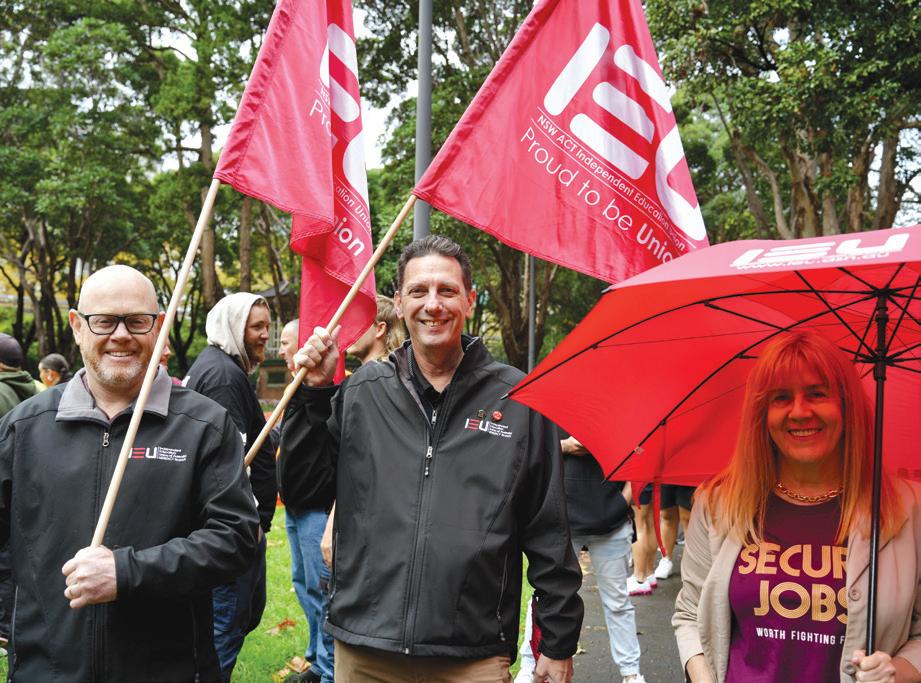

Clockwise from main: Workers gather for speeches in Hyde Park, Sydney, after the May Day march on Wednesday 1 May; the IEU marches in Newcastle for May Day on Sunday 5 May; marching in Newcastle; marching in Sydney; IEU members gather for the Sydney May Day march.


On 3 June, the Fair Work Commission (FWC) handed down its decision in the annual National Wage Case. This is a mandated increase to the minimum wage, and also in award rates, including those in the Educational Services (Post-Secondary Education) Award, which covers most staff in private post-secondary colleges.
The FWC has awarded a 3.75% increase this year, less than the 5% boost the ACTU called for, but more than the 2% suggested by employer groups.
The ACTU also pushed for an additional 4% for awards covering traditionally “feminised” industries (such as aged care and early childhood), as a way of addressing genderbased wage inequalities. The FWC did not consider this in this decision, but FWC President Adam Hatcher did note that changes in the Fair Work Act will make such increases possible in future decisions.
The minimum wage will increase from $882.80 to $915.90 per week (full time), and from $23.23 to $24.10 per hour. Award rates were still being calculated at the time of writing, but post-secondary rates at Level 7 will increase to around
$69, 664.91 (annual) and $66.73 (casual hourly). Rates will change from 1 July.
More visa changes
The federal government continues to turn the screws on student visas, with measures in the budget placing effective caps on student numbers. These new changes will pause applications from new providers and new courses from existing providers for up to a year. They will require new providers to demonstrate a track record of quality delivery and prevent providers under investigation from recruiting new students.
These changes have come following a big bounce back for the sector post-pandemic, feeding into eye-wateringly high migration figures over the last two years. This in turn has put political pressure on the government to reign in those numbers, and regrettably the Labor Party has some form in over-reacting to immigration scare campaigns, though to be fair, other countries like Canada and the UK have also made similar moves.

The proposed changes are yet to pass the Parliament, much less play out in the real world. But those in the sector should prepare themselves for lower student numbers for the rest of the decade compared to numbers since the borders reopened in late 2021.
With the end of the boom possibly in sight, now is the time to build up union membership at your college, as the IEU is much better placed to assist in workplaces with high union density – to paraphrase JFK: the best time to fix the roof is when the sun is shining. If every existing member gets one more person to join, then we will have doubled our strength!
The IEU offers discounted rates to casual and fixed-term contract staff, and all union fees are tax deductible. People can join over the phone or online, and there are many broader benefits to IEU membership (https://www.ieu.asn.au/whyjoin-us/). So get with the strength, and join the IEU today!
Kendall Warren OrganiserOn Monday 3 June, unions and working people from a range of sectors gathered in Sydney’s Martin Place to call for the introduction of industrial manslaughter laws. On average, one person a week dies at work in NSW.
To date, NSW is the only mainland state without lifesaving industrial manslaughter laws. After pressure from unions, in late 2023, the NSW government announced it would introduce an offence of industrial manslaughter into the Work Health and Safety Act 2011 (NSW) during the first half of 2024.
Addressing the rally, NSW Minister for Industrial Relations Sophie Cotsis emphasised the urgent need for workplace safety and made a welcome announcement.
“Tomorrow the Minns Labor government will introduce legislation to make industrial manslaughter an offence,” Minister Cotsis said.
“They will be the strongest laws in Australia with a maximum of 25 years jail and fines of up to $20 million for those corporations who do the wrong thing. We want to make sure that workers go to work and come home safely to their loved ones.”
Greens MP Abigail Boyd and MP Jeremy Buckingham both offered their support as the law goes to the Legislative Council for voting.
What is industrial manslaughter?
Industrial manslaughter occurs when a person who has a health and safety duty engages in conduct contrary to that duty and therefore causes the death of an employee or other person to which they owe the duty.
IEU welcomes new legislation
The Independent Education Union of Australia NSW/ ACT Branch has been participating NSW government and SafeWork NSW consultations through Unions NSW to discuss the scope and extent of the legislation and assist in its successful passage through parliament.
The NSW government’s commitment to introducing industrial manslaughter into WHS legislation is a win for all working people in NSW and a step towards ensuring accountability for deaths that occur at work or because of work.
Emma Ford Industrial Officer
Katie Camarena Journalist
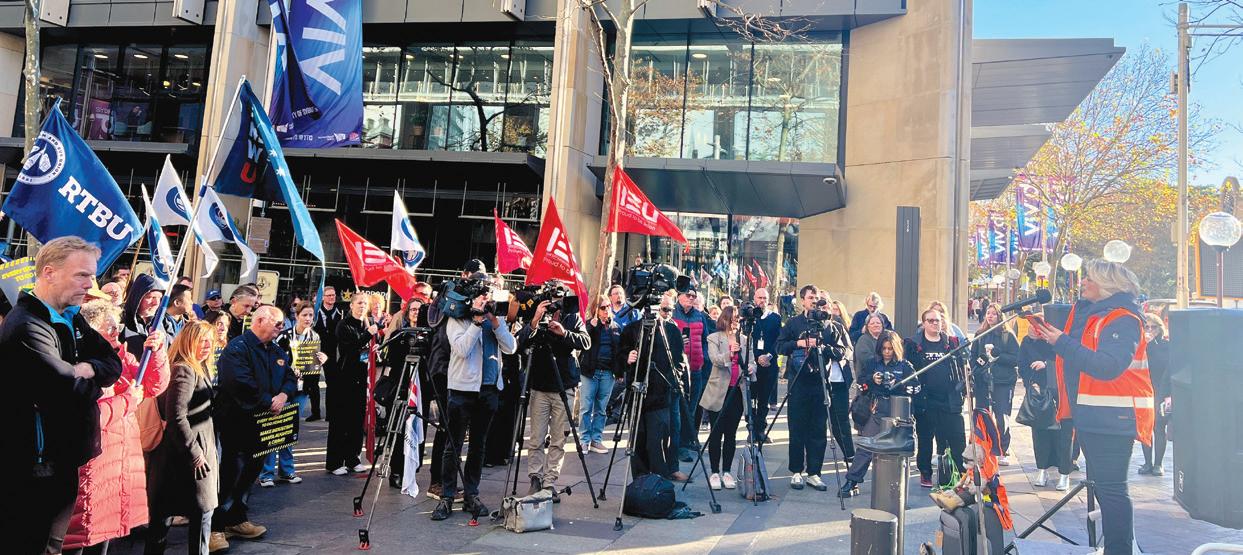

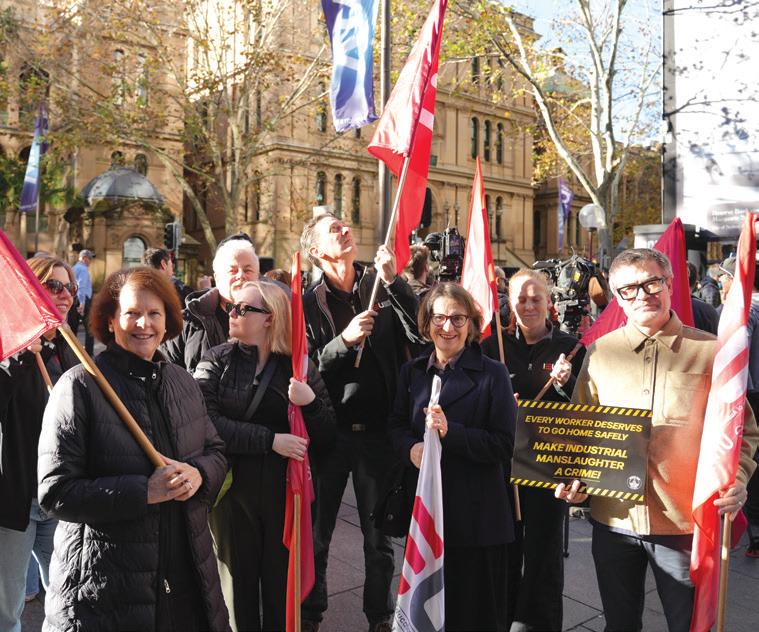
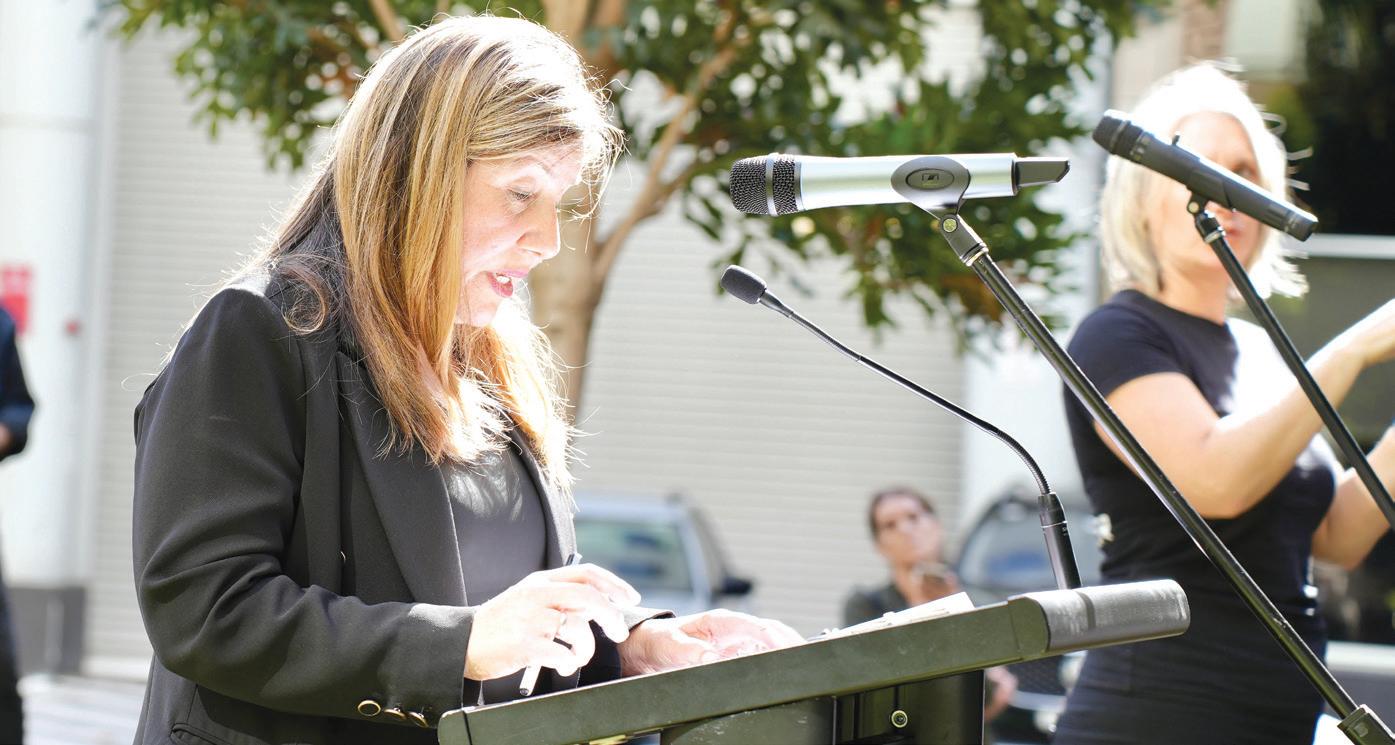
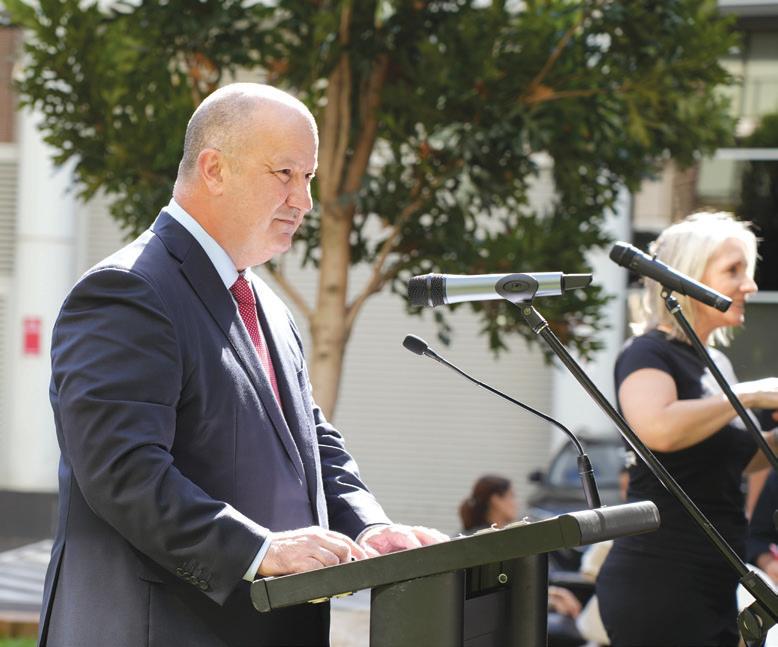
from top:
tributes to people who have died at work. Opposite: Patrizia Cassaniti.

Unions have long fought for the health and safety of all working people. The IEU attended the annual ceremony to honour those who have died at work, and to fight for the living.
On Monday 29 April, the IEU joined other unions, peak body Unions NSW, NSW Industrial Relations Minister Sophie Cotsis, NSW Treasurer Daniel Mookhey and families and friends of victims for a service to remember those who have been injured or lost their lives on the job.
In 2023, 125 people died in workplace accidents throughout Australia, and 8000 incidents were reported to SafeWork NSW alone.
“Every worker has a fundamental right to go to work and to come home healthy and safe,” said SafeWork NSW Acting Deputy Secretary Trent Curtin. “We all must act together, government, businesses, industry and worker representatives, to reduce the risks in our workplaces.”
New laws to make a difference
NSW Industrial Relations Minister Sophie Cotsis acknowledged the women who were killed in Westfield Bondi Junction on 13 April, along with security guard Faraz Tahir, who died trying to stop the attacker.
“Faraz died while working his first shift at Bondi Junction – he gave his life in the defence of others,” Minister Cotsis said. “His actions were courageous and extraordinary. And on this day, when we pay our respects to those who have lost their lives at work, we include Faraz as he was one of us.”
Minister Cotsis also acknowledged the families of those who have lost loved ones at work, and their relentless campaigning for industrial manslaughter laws that the Minns Labor government would introduce into parliament in June. “I want to be clear that we hope we never have to use these laws,” Minister Cotsis said.
“They will be there to send a very strong message about how seriously the government takes workplace safety and to make it known we will uphold the highest standards with regards to work, health and safety.”
Engineered stone to be banned
Unions NSW Secretary Mark Morey acknowledged loved ones’ families and friends and noted progress to keep people safe at work, including the banning of engineered stone, which is the cause of fatal lung disease silicosis, from 1 July — another union-led campaign.
“Change, no matter how slow in coming or how small a step, does ensure there are fewer families who will have to join us in coming years,” Morey said. “Manufactured stone is being banned, and that’s because of the work of the families, the unions and the representatives here today.”
Other speakers on the day included Savannah Fynn from the Metropolitan Local Aboriginal Land
a workplace accident or illness.
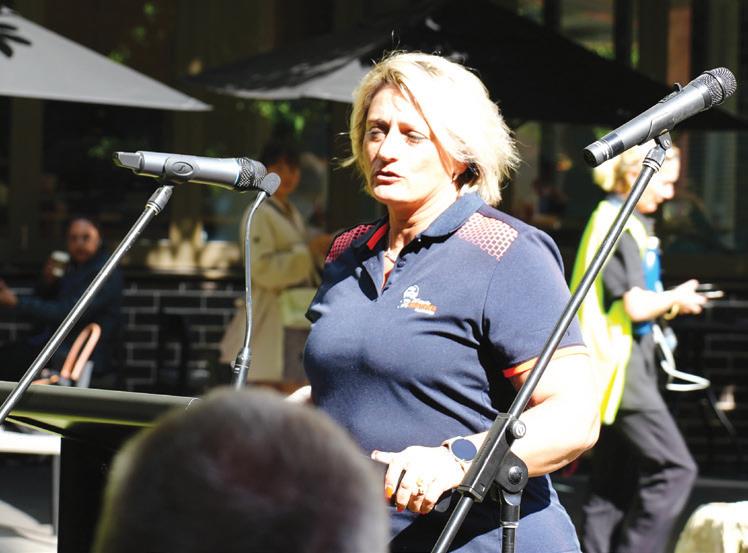
For those in need
Patrizia Cassaniti (pictured above) lost her 18-year-old son Christopher in 2019 when scaffolding he was working on collapsed at Macquarie Park. His colleague Khaled Wehbe was also trapped and suffered crush injuries. The scaffolding company was fined $2 million for the disaster, with NSW District Court Judge Andrew Scotting saying workers were put in “significant peril”. Unions have pressed for closing the loophole that allows insurance policies that cover these fines.
Patrizia has established the Touched by Christopher Foundation, which supports families who lose a loved one at work. To find out more: touchedbychristopher.org.au
Prayer for the fallen by Reverend Ian Lawton
We remember those we have lost with great fondness. They gave much to the world as individuals, family members, friends and work colleagues.
We remember their families in their enormous sadness for those who have died at work building a better place for the rest of us, those who died while constructing our buildings and expressways, hospitals and schools.
For those who have died young and innocent, victims of avoidable accidents, may we learn from this loss, honour the memory of those lost and work towards a safer workplace for all people, where the rights and dignity for all workers are upheld above all else.
The IEU has 19 geographical sub branches across NSW and the ACT, plus the Principals’ sub branch. Sub branches meet four times a year, usually in the first three or four weeks of each term.
Sub branch meetings are a way for reps and members to provide feedback to the union about what’s happening on the ground in their workplaces. The meetings are also an opportunity for reps and members from each region to hear updates from IEU organisers.
Each sub branch sends four to six delegates to quarterly IEU Council meetings. Council is the union’s decisionmaking body, bringing together about 115 member delegates from throughout NSW and the ACT (see p 4).
The IEU Executive of 22 members is elected every three years by members.
All reps and any IEU members who’d like to develop their union activism are warmly invited to attend their region’s sub branch meeting.
Contact your rep or organiser if you’d like more information.
Central Coast
The Central Coast Sub Branch includes Gosford, Erina, Green Point, Lake Munmorah, Tuggerah, Wyong and surrounds.
The Central Coast Sub Branch met on Thursday 9 May at Ourimbah RSL, with four reps from Catholic systemic schools attending.
Broken Bay teachers are paid 1.5% more than teachers in the other Catholic dioceses and undertake fewer hours of face-to-face teaching as part of their enterprise agreement and Work Practices Agreement. These agreements expire in December. We discussed how to maintain these entitlements in the next agreements.
Broken Bay support staff received the same 8% increase as teachers in October 2023. There was a discussion about the importance of maintaining this new differential with other dioceses.
Our next meeting is on Thursday 1 August at Ourimbah RSL. It would be great to see more chapters represented – bring another member and join us for dinner.
Jim Hall Organiser
Central Metropolitan and Metropolitan East
The Central Metropolitan Sub Branch includes central Sydney, Sydney’s inner-western suburbs and Rhodes, Concord and Meadowbank. The Metropolitan East Sub Branch covers the eastern suburbs of Sydney, including Bondi, Waverley, Bellevue Hill and Maroubra.
On Tuesday 14 May we held a combined meeting of our Central Metropolitan and Metropolitan East Sub Branches at our Ultimo headquarters.
IEUA NSW/ACT Branch Assistant Secretary Amanda Hioe provided information about the new bargaining streams available under the Fair Work Act.
Reps discussed issues at their schools, including workplace debates about the meaning of personal leave clauses in enterprise agreements, personal leave rights in different sectors and meeting times. We also heard from a rep at a school that is covered by the modern award, who explained the issues her small chapter faces and their wish to move to an enterprise agreement.
We encourage all reps and members to attend our next combined Central Metropolitan/Metropolitan East Sub Branch meeting in Ultimo on Wednesday 7 August at 4.30pm (parking, child-minding and dinner all provided).
David Whitcombe Organiser
Central West Branch
The Central West Sub Branch includes Dubbo, Bathurst, Orange and Lithgow, as well as Cowra, Mudgee, Parkes, Forbes, Grenfell and Wilcannia.
The Central West Sub Branch met in Orange on 24 May for a dinner meeting, with many chapters represented. Items covered included the new independent school campaign, an ISTAA update, the Catholic systemic campaign, the election of Council delegates (of which we are two short) and the process to elect them (see p 4).
The chapters that were represented raised issues concerning their own workplaces. These included programming, class sizes, and the new pay system to be rolled out across the Bathurst diocese.
This sub branch would like to extend a huge thank you to Bruce Paine for his representation not only at the Central West Sub Branch level but also for his role as Vice President Non-Systemic on the IEU Executive. Bruce has inspired many of us to become active advocates for the IEU.
The sub branch would also like to acknowledge the tireless work of Jackie Groom as our organiser. The thousands of kilometres that she travelled and the support she gave members was astounding. We wish Jackie many more happy adventures in her new sub branch.
Louise Hughes Sub Branch President
The Cumberland Sub Branch includes Parramatta, Mt Druitt, Castle Hill, Marsden Park, Blacktown and nearby suburbs.
The Cumberland Sub Branch meeting was due to be held on May 13 at Club Blacktown. Regrettably, we failed to achieve a quorum. Cumberland is one of the largest sub branches and while we know everyone is busy, it is important that reps give voice to their chapters, particularly as bargaining is underway in AIS schools and Catholic systemic agreements will be up for renegotiation in October.
Our next meeting is scheduled for Monday 29 July at Club Blacktown at 4.30 pm. We invite all reps to attend or encourage another member to attend in your place to represent your chapter. You are welcome to bring a colleague if you’d prefer not to attend on your own.
The union invites you to stay for dinner on us afterwards to recognise your time and effort in representing your chapter.
Lubna Haddad Organiser
The Hunter Valley Sub Branch includes Newcastle, Maitland, Singleton, Scone, Taree and surrounds.
The Hunter Valley Sub Branch met on Monday 13 May with representatives from independent schools, early childhood services and Catholic systemic schools in attendance. Reps from independent schools discussed the current bargaining for a new enterprise agreement, and this networking is invaluable.
The sub branch moved the following motion:
“The Hunter Valley Sub Branch of the IEU calls on the CEO and Director of Schools, Sean Scanlon, to recognise the long-term parity arrangement that exists between Maitland-Newcastle Catholic Schools Office employees and Catholic systemic school employees, and immediately pass on an 8% salary increase retrospective to October 2023.
“The sub branch expresses its deep disappointment in the devaluing of the roles performed by education officers, professional officers, psychologists, and support staff in the CSO. The sub branch calls on the diocese to demonstrate a commitment to education by supporting those employees who we rely on to support schools.
“This chapter notes the increasing disconnect between the diocese and Catholic schools. The chapter views this action as reflective of a lack of understanding of the criticality of the work performed by these members in supporting the educational and wellbeing needs of school communities.” Carried unanimously. (See also p 6.)
Therese Fitzgibbon Organiser
Ku-ring-gai
The Ku-ring-gai Sub Branch covers Sydney’s north shore, including Hornsby, Wahroonga, Waitara, Warrawee, Thornleigh, Pymble, Turramurra, Berowra and Asquith.
The Ku-ring-gai Sub Branch met for Term 2 on Monday 13 May. We had a record turnout with reps and members from a broad range of schools – Catholic systemic, independent, primary, secondary, teachers and support staff. As well as Ku-ring-gai organisers Charles Wheeler and James Jenkins-Flint, the meeting welcomed IEUA NSW/ACT Branch Deputy Secretary David Towson and Media and Communications Coordinator Monica Crouch.
Discussion included bargaining in independent schools and the IEU’s claim, the future of the Independent Schools Teacher Accreditation Authority (ISTAA) process, Catholic systemic issues specific to the Diocese of Broken Bay and of course workload intensification and staff wellbeing. As always, it was a great chance for attendees to compare notes, share stories, network and learn from each other.
The Ku-ring-gai Sub Branch will meet in the bistro at Hornsby RSL at 4:30pm on August 5. Join us to talk about the issues at your school, and to share a meal and a drink.
Charles Wheeler Organiser
The Mid North Coast Sub Branch includes Coffs Harbour, Kempsey, Port Macquarie, Bellingen, Nambucca Heads and surrounds.
Ten delegates, all from Catholic systemic schools, attended the Mid North Coast meeting at Port Macquarie on Friday 17 May.
With a new Catholic enterprise agreement (EA) and the Lismore Work Practices Agreement (WPA) to be negotiated later this year, there were many suggestions about what to consider in our claim, including:
limiting the number of playground duties in primary schools ensuring extra playground duties are counted towards the extras limited by the WPA
• appropriate allocation of leadership points for leaders of wellbeing, ensuring best practice and consistency across the diocese
special sick leave as per NSW Department of Education provisions, that is: “Special sick leave may be granted to a full-time permanent teacher on the basis of 22 additional working days for each completed 10 years of service”.
The sub branch passed a motion that the special sick leave claim be taken to June Council, seeking broader union support.
Other issues raised included support staff workloads, the diocese’s redeployment policy, workload impositions on mentors, student disciplinary procedures and the lack of recognition of the work of teacher-librarians.
We also considered how the union might best recognise and celebrate the work and achievements of long-standing members who have made significant contributions to the IEU. A motion was passed supporting this. Suzanne Penson will raise the matter at the next IEU Executive meeting.
Our Term 3 sub branch meeting will be held at Sawtell RSL on Friday 2 August followed by dinner. We look forward to seeing you there.
Markus Muschal Sub Branch President
Monaro
The Monaro Sub Branch covers Canberra and the ACT. It met on Thursday 23 May 2024.
We congratulated our newly elected IEU Council members: David Caton, Alex Thompson, Anne Leet, Dianne Lefebvre, Jacob Betts and Kate MacDonald. We thanked the outgoing Council member, Eugene Lehmensich, for his engagement and participation on Council.
We also extend congratulations to our new IEU Vice President ACT, on the IEU Executive, Andrew Dane.
Much of the meeting conversation revolved around ongoing member concerns about the lack of relief staff and the impacts of this. Staff are being asked to fill absences by taking on additional classes, doubling classes, plus teaching while providing minimal supervision to another class.
Schools are using creative ways to manage the staff shortages. However, often the solutions result in increased workload for staff who are already under pressure due to overwhelming workloads.
Members expressed health and safety concerns for staff and students and urged the IEU to explore all options to ensure that schools are safe.
Dianne Lefebvre Sub Branch PresidentNorth Coast
The North Coast Sub Branch covers Lismore, Tweed Heads, Kingscliff, Pottsville, Murwillumbah, Mullumbimby, Kyogle, Ballina, Lismore, Casino, Coraki, Woodburn, Yamba and Maclean.
The meeting was held on Wednesday 15 May at Ballina Indoor Sports Centre and was well attended with 14 reps across Catholic systemic schools, Catholic independent schools, CSA Christian schools and AIS independent schools. Acting Secretary David Towson and Industrial Officer Carolyn Moore attended.
This diverse mix of schools made for interesting feedback, and discussion included:
• the good engagement of Christian school staff with the IEU’s petition to the employer about their enterprise agreement AIS sector: pay disparity is the biggest issue and workloads are increasing. There is no time in lieu for staff attending interstate or overseas excursions (learning experiences) in non-term time the possibility of single-interest bargaining is attractive for some AIS schools
itwas good to hear that some Catholic systemic schools have drastically cut back on meeting times allowing more time for teachers to plan, mark, program etc – this change has been welcomed by members cycle of improvement goals have been reduced from two to one, in recognition of teacher workloads new timetables have been introduced resulting in new classes and courses for some secondary teachers some schools may make coordinator positions permanent learning walks into classrooms by executive are regularly happening in one school and reports of the learning walks are published on the school intranet.
Richard Ryan Organiser
Northern Beaches
The Northern Beaches Sub Branch includes Manly, Dee Why, Collaroy, Narrabeen, Terrey Hills, Warriewood and surrounds. While we didn’t reach a quorum at our meeting, we encourage all reps in the sub branch to attend the next meeting, to be held at 4pm on 31 July at the Collaroy Services Club. We warmly invite you to join us and share a meal after the meeting, and you’re welcome to bring another member with you. We look forward to seeing you.
Megan Bruce Organiser
Northern Suburbs
The Northern Suburbs Sub Branch covers Artarmon, Chatswood, Cremorne, Gladesville, Gordon, Hunters Hill, Kirribilli, Lane Cove, Lindfield, Milson’s Point, Mosman, North Sydney, Roseville, Ryde, St Ives, St Leonards, Willoughby and Woolwich.
The meeting was held on Tuesday 7 May at 4pm. Reps reported that casual teachers for Catholic systemic schools in the lower North Shore are still difficult to find. This is despite the Broken Bay Diocese’s premium in pay for both permanent and casual staff.
Reps also reported that managing student behaviour is becoming more difficult due to parents resisting school disciplinary policies and school leadership, in some cases, relenting to parental pressure. Unreasonable workloads around the NCCD have returned to some schools, with executive staff completing tasks during the school non-term time, with the requirement to complete such tasks coming from ‘diverse learning’ teams within Sydney Catholic Schools.
James Jenkins-Flint Organiser
North West
The North West Sub Branch covers the New England region, including Armidale, Tamworth, Gunnedah, Tenterfield, Inverell, Moree and Narramine.
The Term 2 North West Sub Branch was held in the evening of Friday 10 May with a solid group of delegates as well as some last-minute apologies due to illness. We had plenty of members to celebrate, with 40-year membership presentations pending for Michael Perkins, currently working across several Catholic systemic primary schools, and Joe Dimech of St Nicholas Primary School Tamworth. Colleagues also acknowledged Geraldine Chapman, based at the Catholic Schools Office, earlier in the year. At Armidale’s O’Connor Catholic College, Kathryn Czinner, Vicki Channon and Denise Fittler are all marking 30 years of continuous membership.
The sub branch congratulates and acknowledges the contribution of each of these members.
Our sub branch also congratulates Kara Spicer who received an IEU Environment Grant on behalf of O’Connor Catholic College.
The campaign for AIS schools was a key agenda item with PLC, Calrossy, TAS (The Armidale School), NEGS (New England Grammar School), Minimbah and now Carinya Christian School seeing the expiry of their current MEA in January 2025. Bargaining between the
IEU and the AIS has commenced and members have been asked to endorse the claim and encourage non-members to support the negotiations by joining their union.
Moree and Liberty Christian Schools in our sub branch are covered by the Christian Schools Australia Agreement and were noted as being in a gridlock situation with a petition of members underway.
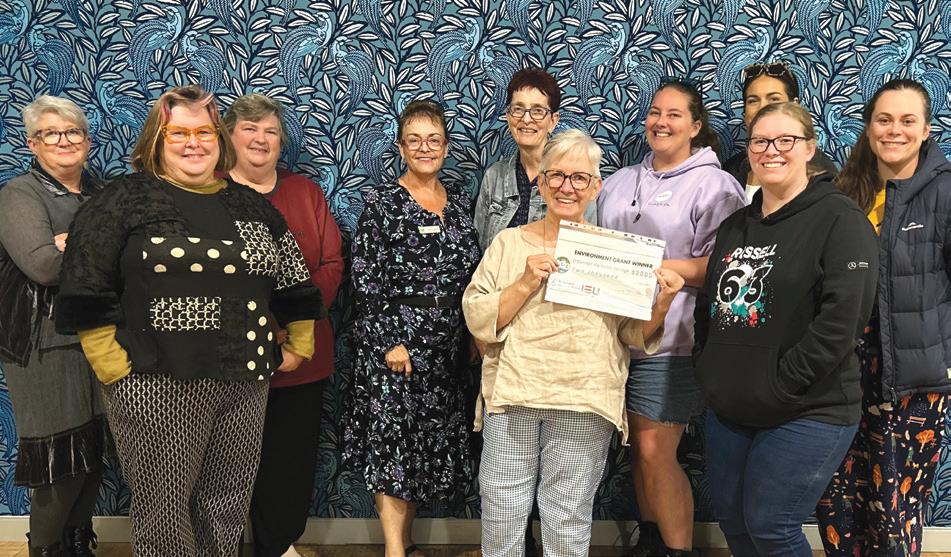
The meeting concluded with one of our delegates proposing a motion that was endorsed unanimously:
“The North West Branch calls on the IEU to pursue with the Minister for Education and NESA that the need to have programs as evidence of compliance is unnecessary.”
The sub branch meets again on Friday 2 August in Tamworth. All IEU reps and interested members in the North West are welcome to attend and join us for a meal afterwards.
Sue McKay OrganiserThe Penrith/Blue Mountains Sub Branch covers Penrith to Glenbrook, Katoomba and Blackheath.
The Penrith/Blue Mountains Sub Branch meeting was held on 22 May at the Nepean Rowing Club, Penrith. Attendance was good, with members reconnecting and sharing their experiences.
Outgoing Secretary Margaret O’Donnell was honoured for her years of dedicated service, with a motion passed expressing gratitude for her contributions.
Upcoming actions include launching an online petition to advocate for improved CSA offers and preparations for the independent schools’ campaign. Focus areas will include teacher workload, fair processes, and parental leave improvements.
There was disappointing engagement in Council elections, with vacancies across the state. A subsequent election is under way to fill these vacancies, for more details and how to nominate, see p 4.
We urge members in our sub branch to participate in upcoming meeting, campaigns, and events to strengthen union efforts and ensure fair negotiations for enterprise agreements.
The sub branch acknowledges the work of the IEU in CSA (Christian schools) negotiations, appreciating the focus on member participation, with 92 per cent of CSA members rejecting the offer.
The campaign for members in independent schools is ramping up; and we encourage Catholic systemic members to talk to their organiser ahead of negotiations for a new agreement in October.
Liz Heggart Sub Branch President
South Coast
The South Coast Sub Branch covers the Macarthur region, the Southern Highlands, Wollongong and the Illawarra region and the northern end of the Shoalhaven region.
The South Coast Sub Branch held its Term 2 meeting on Wednesday 15 May, at City Diggers with 19 members in attendance.
Members raised ongoing concerns with payroll matters, classification issues, and a lack of casual teachers, which is impacting many schools across the sub branch. The union advises members to keep records and contact their organiser for support.
The Term 3 South Coast Sub Branch meeting will be held on Wednesday 31 July at Campbelltown RSL. All reps and interested IEU members are welcome to attend, with dinner following the meeting.
Luke Breen and Valerie Jones Organisers
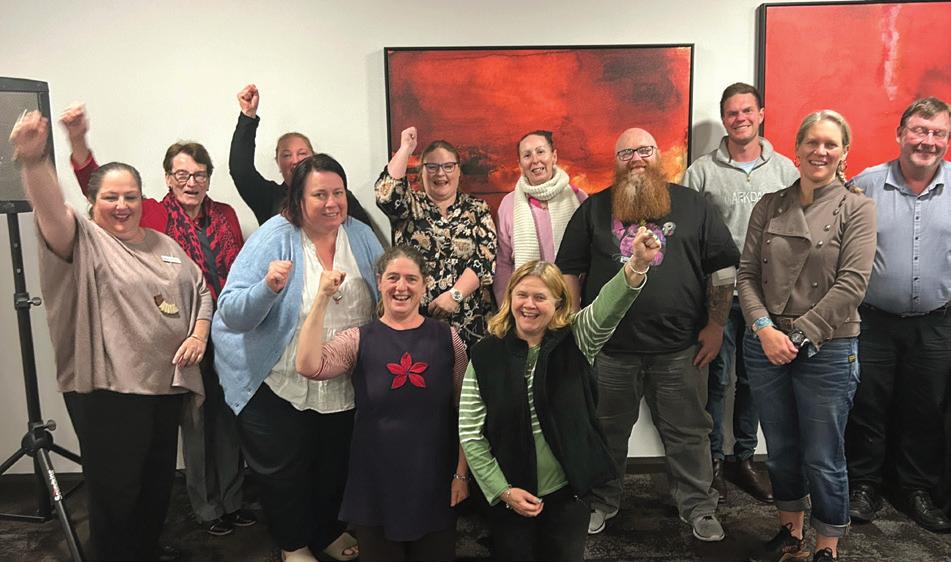
The South East Sub Branch covers Yass, Young, Broulee, Bega,
Batehaven, Cooma, Queanbeyan and Batlow.
The South East Sub Branch met at the Quality Hotel in Dickson, ACT on Friday 17 May. Delegates travelled from Yass, Young, Pambula, Bega, Googong, Batehaven, Cooma, Queanbeyan and Batlow. The meeting welcomed IEU organisers Jackie Groom and Angela McDonald; as well as IEUA NSW/ACT Branch Assistant Secretary Lyn Caton.
It was pleasing to learn that the South East Sub Branch had a full complement of delegates elected to IEU Council. Congratulations to Linda Swadling, Simon Fraser, Terrianne Ryan, Leonne Challon and Margaret Findlay (for more about Council, see p 4).
The sub branch appreciated the work of the union with AITSL and NESA to assist in reducing teacher workloads around compliance.
Issues raised by schools and discussed included: relief from face-to-face (RFF) teaching for part-time staff
• on return from sick leave, staff are being given ‘extras’ – perceived by members as a punishment
low Variation Curriculum and InitiaLit literacy program annotation expectations
middle management being ‘loaded up’ when off class as well as having their own teaching load
• targeted teachers for acceleration being asked to do more/attend more PD along with no additional time release continued aggressive behaviour (and its allied trauma for students and teaching staff)
mandatory training outside of work hours
social media postings by students relating to staff and the effects on the professional and personal life of staff
Linda Swadling President
Southern Suburbs
The Southern Suburbs Sub Branch covers the St George area and Sutherland Shire.
The Southern Suburbs Sub Branch meeting was well attended eith close to 20 reps. We welcomed some new reps to their first sub branch meeting: Madeline Turner from St Jospeh’s Catholic Primary School in Como, Rimas Kazokas from St Patrick’s College in Sutherland, Katherine Gavrielatos from St Francis Xavier Catholic Primary in Arncliffe, Simon McLean from Bethany College in Hurstville, and Phillip Pain from St George Christian School also in Hurstville.
Discussion ranged across a variety of topics, including: support requirements for relieving RFF teachers requirements for Year 7 interim reports and parent teacher interviews. permanency for LSOs.
entitlement to a 30-minute uninterrupted lunch break.
There was a stress on the need for individual school chapters to come together to solve issues and mould their workplaces to benefit staff. The new AIS campaign was welcomed as an opportunity to put into place workload reduction mechanisms alongside increased pay and improved parental leave and long service leave provisions.
Josef Dabbs Organiser
Principals’ Sub Branch
Principal reps from NSW and the ACT met on 11 April at the IEU’s office in Sydney.
The meeting opened with a presentation by IEU Professional Engagement Coordinator Pat Devery who spoke about the new Australian Teacher Performance and Development Framework (ATPDF) developed by the Australian Institute for Teaching and School Leadership (AITSL) in consultation with the IEU (see pp 9-12).
The Fact Sheet provides clear and concise advice about what is required to comply with the ATPDF and identifies practices that are excessive. Principals expressed their gratitude for the IEU’s advocacy and expertise in this space.
A wide variety of matters were raised including: Issues around payroll, finance and classification of staff, including the transition of payroll cycles, overpayments and frequency.
The introduction of new policies and the lack of consultation, particularly regarding the employment of casual staff, workers compensation and student graduations.
Significant budget cuts at all levels of governance.
Principal tenure and its challenges in each diocese and/or school.
The announcement of the new interim director for SCS was welcomed.
Members talked about the role of the IEU chapter rep and their organiser, and the potential to meet on a more regular basis. Several diocesan principal chapter meetings were canvassed, with the first in Lismore on 5 June.
We thank all principal reps for their ongoing support of their member colleagues and attendance at the sub branch.
Lyn Caton Principals’ Organiser
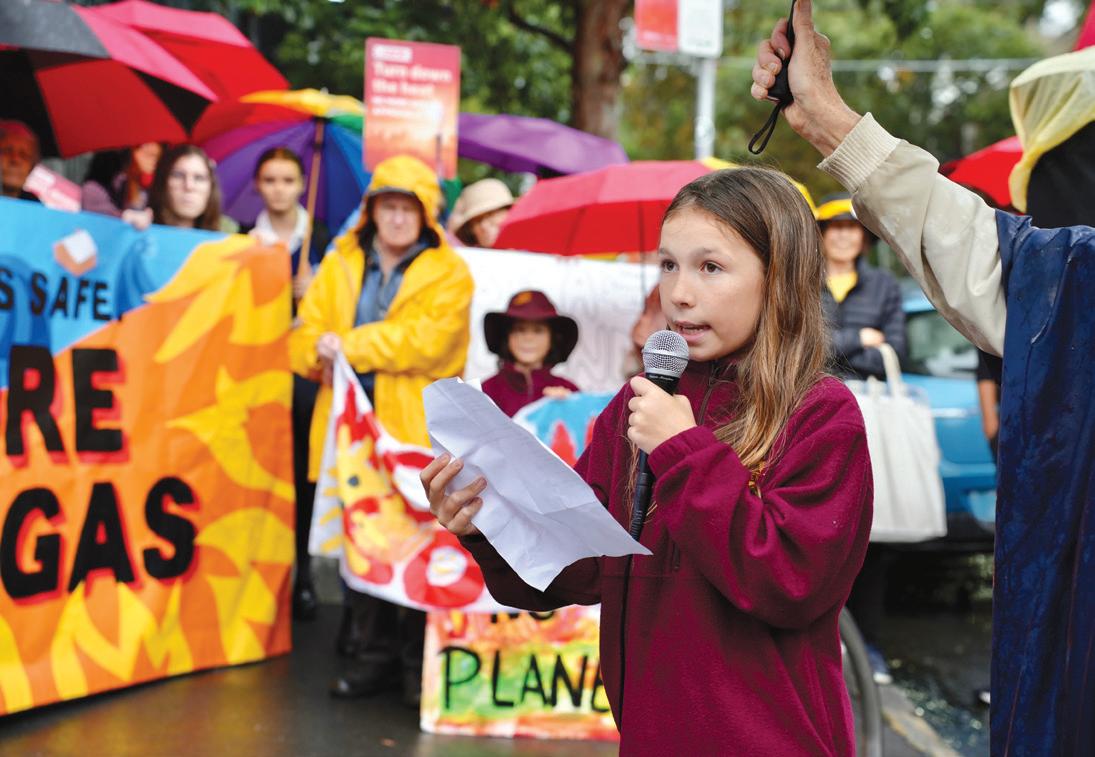

Led
“The
“We
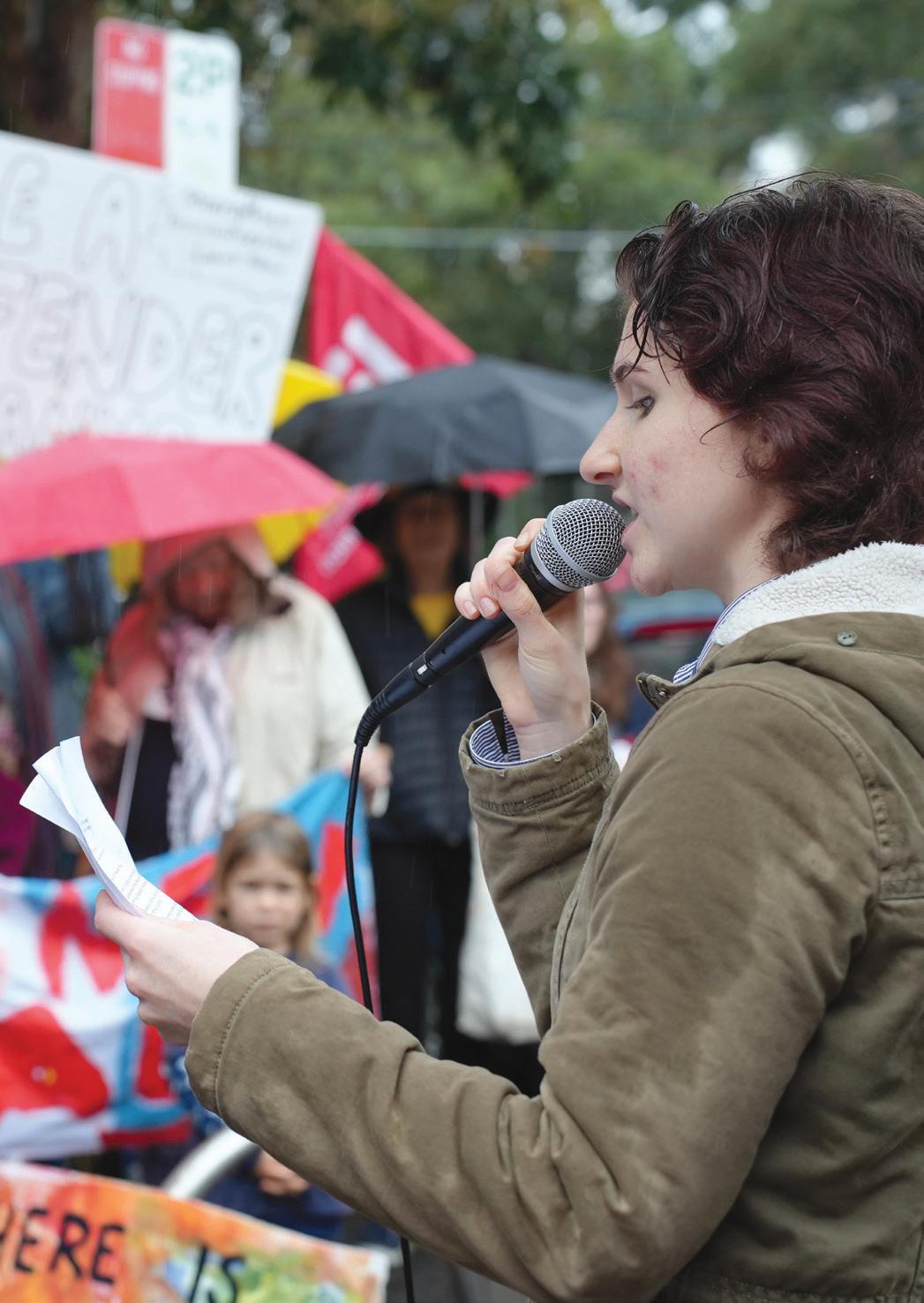




As the Super Guarantee (SG) rate moves up to 12% in 2025 (11.5% from 1 July 2024), retirement savings will increase, especially for those entering the workforce now and in the future. Our world-class retirement savings system, which is the envy of many nations, will become exponentially larger, reflecting higher account balances and a significant pool of our national savings.
For this reason, it is important to enshrine the purpose of super into law now. It should not be looked at as a ‘honeypot’ for future governments to use on an ad hoc basis. Our current government is aware of this and is reviewing legislation that would provide certainty as to the purpose of superannuation.
The proposed definition of the purpose of super is: “To preserve savings to deliver income for a dignified retirement, alongside government support, in an equitable and sustainable way.”
Federal Treasurer Jim Chalmers has stated he wants to end the “super wars” by making sure any future changes to the system are compatible with its very objective. The three key points in this definition are “preserve savings”, “to deliver income”, and “a dignified retirement”.
Preservation rules are in place to prevent any drawing down of super prior to retirement (which includes age requirements). Delivering income refers to regular payments or an income stream which in effect replaces salary. And a dignified retirement refers to the adequacy of savings –enough for the retired worker to live comfortably after a lifetime of contributing to the Australian economy, tax, and the welfare of the nation.
COVID withdrawals
Part of the reason this is an issue now is because super was released during the height of the COVID pandemic. About $36 billion was withdrawn at that time from superannuation by 3 million Australians.
This large depletion of the superannuation pool will result in not only smaller retirement balances for the people who withdrew money, but also for society, with Australians having to pay increased levels of age pension for those who require it. This is because the people who dipped into their super will be forced to rely on the age pension later on.
The ‘adequacy’ element will have been reduced. Based on modelling by the Super
Members Council, the long-term cost of the COVID withdrawals is expected to reach about $85 billion, with the cost to future taxpayers to fund that shortfall of about $3000 each.
And the Super Members Council has estimated that the full withdrawal of funds under the COVID rules could cost a 30-year-old $90,000-plus at retirement. Estimates suggest that six out of 10 early releases of super were made by workers under 35.
Detrimental dipping
Some on the right of the political spectrum put arguments forward such as, “It’s their money so why not let them use it?” or, “Housing is a right, so why shouldn’t we allow first home buyers to draw down their super for a home?”
These arguments, however attractive they may appear to be, miss the point of super, which is for retirement purposes only. Governments are put in place to solve difficult problems and that is what they must do, not dip into superannuation savings of Australian workers.
Assistant Treasurer Stephen Jones has stated, “It’s crystal clear that the former government’s raid on the super system had a devastating impact on the retirement savings of millions of Australians.” And the younger people who withdrew their super (in many cases the entire balance was withdrawn), the greater the loss due to the loss of compound interest.
Jones also stated, “It’s why the Albanese government is committed to legislating an objective of super to help prevent this sort of short-sightedness ever happening again.”
Although most withdrawals were used to address immediate financial needs, it was also noted that a large number of people used the money for gambling. Bernie Dean, from Industry Super, observed, “People faced a wicked choice between sacrificing their retirement savings and bailing themselves out during the early stages of the COVID pandemic. No government should ever force Australians to make that choice again”.
Bernard O’Connor (former Company Secretary, NGS Super)
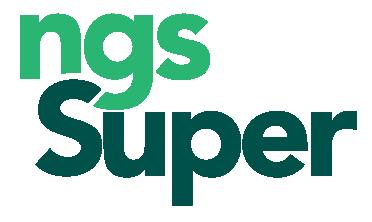
Secretary Carol Matthews Eora Nation
Deputy Secretary David Towson Eora Nation
Assistant Secretary
Caton Dharug Nation
Assistant Secretary Amanda Hioe
Eora Nation
President Tina Ruello
Catherine McAuley Westmead
Dharug Nation
Vice President Systemic
Liz Heggart
Penola Catholic College Emu Plains Dharug Nation
Vice President Non Systemic
Helen Templeton
St Scholastica’s College Glebe
Eora Nation
Vice President Support Staff
Kylie Booth-Martinez
Assumption Catholic Primary School and St Stanislaus College Bathurst Wiradjuri Nation
Vice President ECS
Michelle Thompson Shore Preparatory School
Early Learning Centre Northbridge Eora Nation
Vice President ACT
Andrew Dane
Brindabella Christian College Lyneham Ngunawal Nation
Financial Officers
Denise McHugh
NESA Liaison Officer
Kamilaroi Nation
Suzanne Penson
MacKillop College Port Macquarie Birpai Nation
General Executive Members
Nicole Downey
St Mary’s Catholic Primary School Orange Wiradjuri Nation
Sarah Gardiner
Catherine McAuley Catholic College Medowie
Worimi Nation
Amy Kermode
Mount St Joseph Milperra
Eora Nation
Glenn Lowe (Deputy President)
St Joseph’s Catholic High School
Albion Park
Dharawal Nation
Anna Luedi
Villa Maria Catholic Primary School
Hunters Hill
Dharug Nation
Raelene Maxworthy
Calrossy Anglican School Tamworth
Kamilaroi Nation
Peter Moore
Our Lady of Mercy College Burraneer
Tharawal Nation
Markus Muschal
St John Paul College Coffs Harbour Gumbaynggirr Nation
Christine Wilkinson
St Joseph’s Catholic College East Gosford
Darkinjung Nation
Amanda Wood
St Aloysius Primary School Chisholm Awabakal Nation


Author: Kate Grenville
Publisher: Text Publishing
What if Elizabeth Macarthur, wife of the notorious John Macarthur, wool baron in the earliest days of Sydney, had written a shockingly frank secret memoir? And what if novelist Kate Grenville had miraculously found and published it?
A Room Made of Leaves is set in the past, but it’s just as much about the present, where lies have the dangerous power to shape reality. This book is historical fiction turned inside out, a stunning sleight of hand by one of our most original writers.

Author Elliott Perlman
Illustrator: Laura Stitzel
Publisher: Puffin Books
When a pampered cat has to share her home with a lost dog, sparks are set to fly. To her surprise, Catvinkle starts to like Ula. She even tells Ula her three secrets. But a cat and a dog can’t be friends – can they?
A tailspin of a tale that will make you howl with laughter –and remind you that if you aren’t open to adventure, you might never meet your best friend in production.

Authors: Banjo Woorunmurra and Howard Pedersen
Publisher: Magabala Books
The true story of the Aboriginal resistance fighter, Jandamarra, whose legend is etched into the Australian landscape. Set in the Kimberley outback during the late nineteenth century, the last stage of Australia’s invasion is played out in the lands of the Bunuba people. Leases are marked across Aboriginal country and, amid the chaos and turmoil, extraordinary and sometimes contradictory relationships develop. A powerful collaboration between a non-Indigenous historian and the Indigenous custodians of the Jandamarra story.
To go in the draw, email entries to giveaways@ieu.asn.au with the title of the book you would like to receive in the subject line. Write your name, membership number and postal address in the body of your email. All entries must be received by 23 July 2024.

